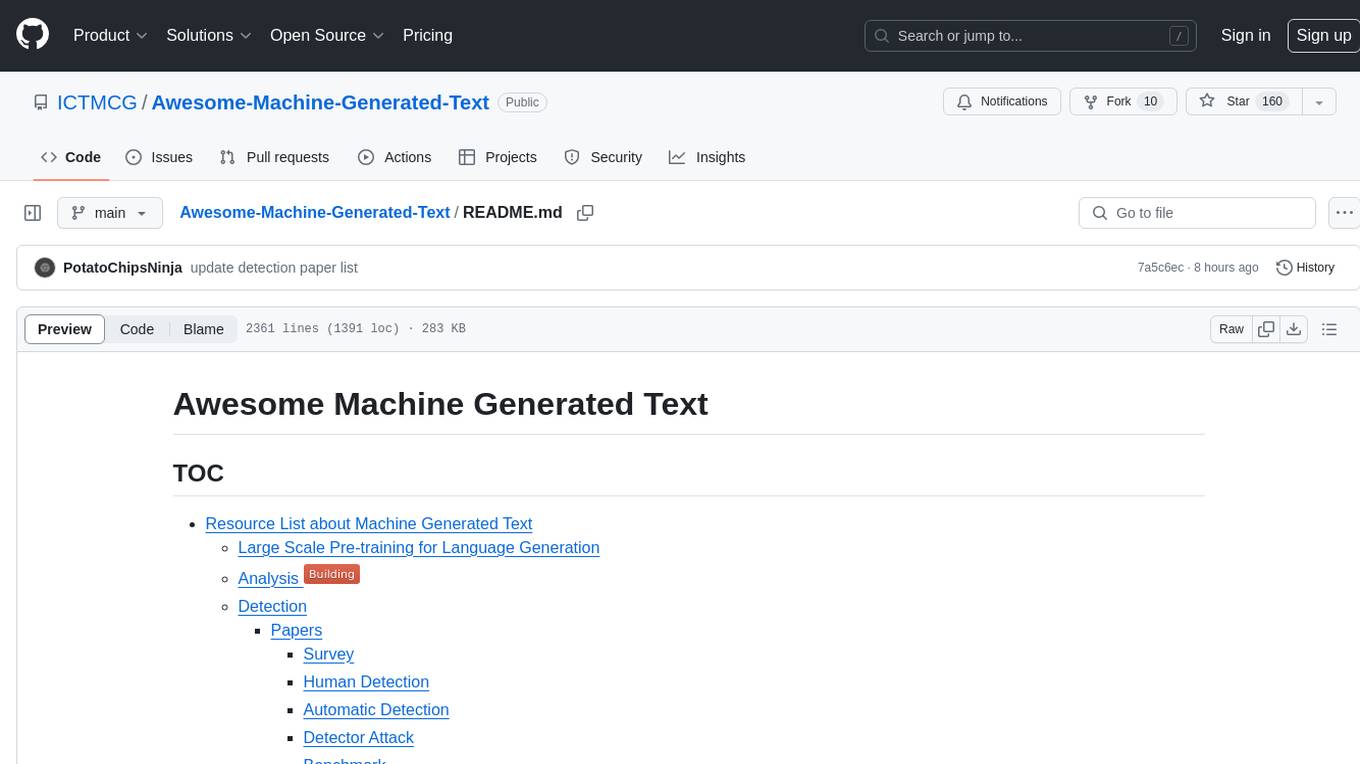
nlp-phd-global-equality
A repo for open resources & information for people to succeed in PhD in CS & career in AI / NLP
Stars: 842
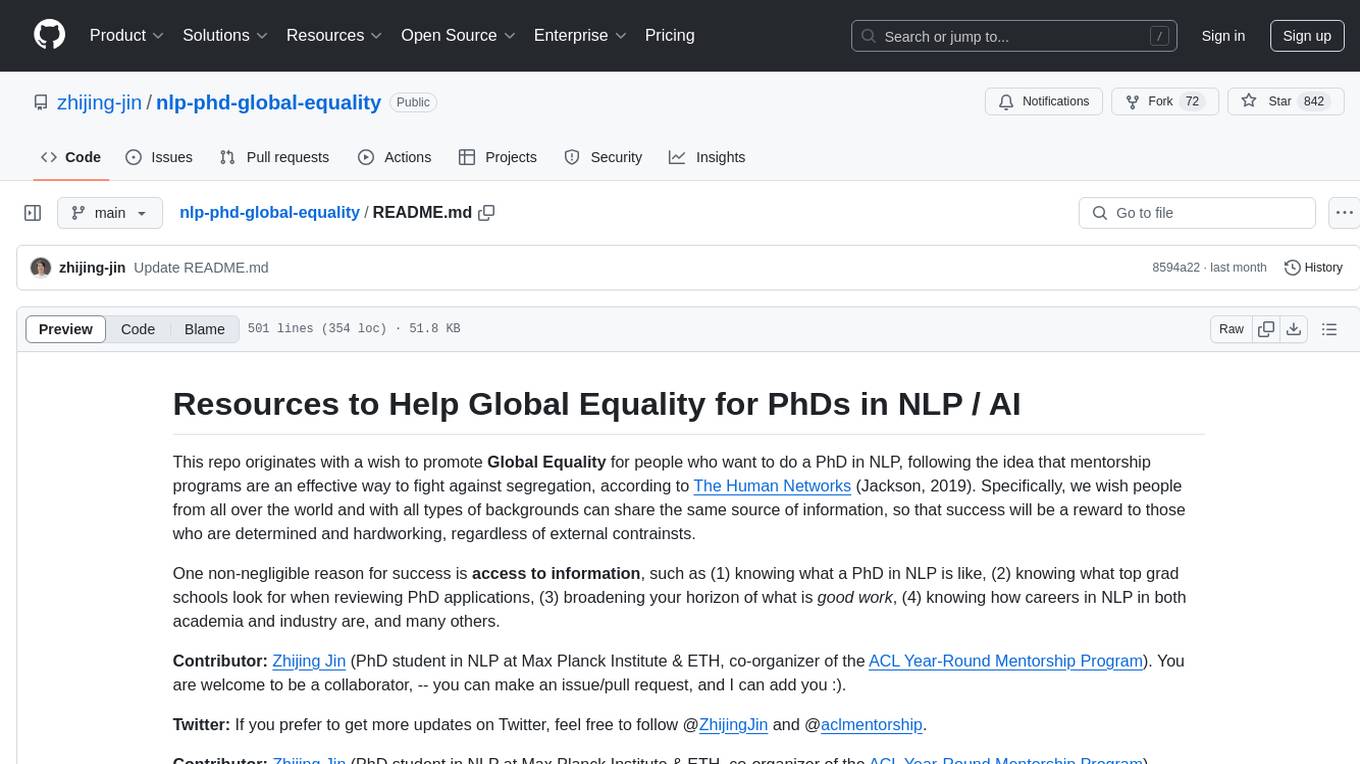
This repository aims to promote global equality for individuals pursuing a PhD in NLP by providing resources and information on various aspects of the academic journey. It covers topics such as applying for a PhD, getting research opportunities, preparing for the job market, and succeeding in academia. The repository is actively updated and includes contributions from experts in the field.
README:
This repo originates with a wish to promote Global Equality for people who want to do a PhD in NLP, following the idea that mentorship programs are an effective way to fight against segregation, according to The Human Networks (Jackson, 2019). Specifically, we wish people from all over the world and with all types of backgrounds can share the same source of information, so that success will be a reward to those who are determined and hardworking, regardless of external contrainsts.
One non-negligible reason for success is access to information, such as (1) knowing what a PhD in NLP is like, (2) knowing what top grad schools look for when reviewing PhD applications, (3) broadening your horizon of what is good work, (4) knowing how careers in NLP in both academia and industry are, and many others.
Contributor: Zhijing Jin (PhD student in NLP at Max Planck Institute & ETH, co-organizer of the ACL Year-Round Mentorship Program). You are welcome to be a collaborator, -- you can make an issue/pull request, and I can add you :).
Twitter: If you prefer to get more updates on Twitter, feel free to follow @ZhijingJin and @aclmentorship.
Contributor: Zhijing Jin (PhD student in NLP at Max Planck Institute & ETH, co-organizer of the ACL Year-Round Mentorship Program).
Endorsers of this repo: Prof Rada Mihalcea (University of Michigan). Please add your name here (by a pull request) if you endorse this repo :).
- Top Resources
- Stage 1. (Non-PhD -> PhD) How to Apply for a PhD?
-
Stage 2. (Doing PhD) How to Succeed in PhD?
- Overall Guides
- Timely Topic: Surviving NLP in the Era of LLMs
- What Are Weekly Meetings with Mentors/Advisors like?
- How to Read Papers
- How to Express Our Ideas: Writing Papers, Visualization, etc
- Reviewing, Publishing, Attending Conferences, Networking
- Memoir-Like Narratives
- Excel Your Research
- Coming Up with Good Research Ideas
- Internship
- Grad School Fellowships
- Books
- Stage 3. (After PhD -> Industry) How is life as an industry researcher?
- Stage 4. (Being a Prof) How to get an academic position? And how to be a good prof?
- Stage 5. (Whole Career Path) How to live out a life career as an NLP researcher?
- Further Readings: Technical Materials to Improve Your NLP Research Skills
- Others
- Contributions
- How to Cite This Repo
- Online ACL Year-Round Mentorship Program: https://acl-mentorship.github.io (You can apply as a mentee, as a mentor, or as a volunteer. For mentees, you will be able to attend monthly zoom Q&A sessions hosted senior researchers in NLP. You will also join a global slack channel, where you can constantly post your questions, and we will collect answers from senior NLP researchers.)
- (Organized by PhD students in NLP across the world) NLP with Friends Online Seminar Series (recordings available). [Seminar] (A great way to learn about what others are doing in NLP)
- (John Hewitt, PhD@Stanford) Undergrad to PhD, or not - advice for undergrads interested in research (2018). [Suggestions]
- (Prof Jason Eisner@JHU) Advice for Research Students (last updated: 2021). [List of suggestions]
- (Nelson Liu, PhD@Stanfard) Student Perspectives on Applying to NLP PhD Programs (2019). [Suggestions Based on Surveys]
- (Prof Dragomir Radev@Yale) Advice for PhD Applications, Faculty Applications, etc (2023). [List of Suggestions]
- [(Roma Patel PhD@Brown, Prof Nathan Schneider@Georgetown University) PhD Application Series of the NLP Highlights Podcast) (2021). [Podcast] (A new series they launched that addresses all aspects of PhD application. Besides, it is just a great podcast in general that talks about recent NLP advances)
- (Albert Webson et al., PhDs@Brown University) Resources for Underrepresented Groups, including Brown's Own Applicant Mentorship Program (2020, but we will keep updating it throughout the 2021 application season.) [List of Resources]
- A Princeton CS Major's Guide to Applying to Graduate School. [List of suggestions]
- (Tim Dettmers, PhD@UW) Machine Learning PhD Applications — Everything You Need to Know (2018). [Guide]
- (Kalpesh Krishna, PhD@UMass Amherst) Grad School Resources (2018). [Article] (This list lots of useful pointers!)
- (Prof Mor Harchol-Balter@CMU) Applying to Ph.D. Programs in Computer Science (2014). [Guide]
- (CS Rankings) Advice on Applying to Grad School in Computer Science. [Pointers]
- (Prof Scott E. Fahlman@CMU) Quora answers on the LTI program at CMU (2017). [Article]
- (Prof Philip Guo@UCSD) Finding CS Ph.D. programs to apply to. [Video]
- [(Tim Dettmers, PhD@UW) How to Pick Your Grad School (2020). [Guide]
- (Zhijing Jin, PhD@MPI & ETH) Tips on PhD Applications with Max Planck Institute and/or ETH in AI (2021). [Suggestions]
- (Prof Nathan Schneider@Georgetown University) Inside Ph.D. admissions: What readers look for in a Statement of Purpose. [Article]
- (Nelson Liu, PhD@Stanfard) PhD Statement of Purpose. [Article]
- (Suchin Gururangan, PhD@University of Washington) Personal Statement Advice. [Article]
- (Prof Shomir Wilson@Penn State University) Reference Letter Procedure. [Suggestions]
- (Zhaofeng Wu, Alexis Ross, and Shannon Shen@Cambridge) A Collection of Strong CS SOPs from Successful Applicants. [Samples]
- (Andrew Kuznetsov, PhD@CMU) CS/HCI PhD Opportunity Tracker from Twitter (Developed in 2021). http://www.andrewkuz.net/hci-opportunities-2022.html
- (Eugene Vinitsky, PhD@UC Berkeley) A Guide to Cold Emailing (2020). [Article]
- (Prof Shomir Wilson@Penn State University) Guide for Interacting With Faculty (2018). [Suggestions]
- (Prof Shomir Wilson@Penn State University) Reference Letter Procedure. [Suggestions]
Pre-PhD Research Opportunities:
- Summer research opportunities for Undergrads (2021). [Twitter Thread]
- (Berkeley) AI safety research at the CHAI lab under Stuart Russell, usually with his PhD and postdocs. [Apply]
- (ETH) ETH Summer Research Fellowship (every summer). [Apply]
- (Vector Institute / UofT) Vector Research Internships. [Link]
- (Mila) Research Internships. [Apply]
- (Remote or in-person) Pre-PhD Research Project with Zhijing Jin. [Application forms] [Position info at MPI]
- (Remote) Neel Nanda’s MATS program on Mechanistic Interpretability. Check his homepage for applications.
- (MPI; open any time of the year) 6-month research internship for Master students (e.g., for Master thesis, other research project, etc.) at Max Planck Institute with Bernhard Schoelkopf. [Apply]
- (MPI) Summer Research Internship with MPI (CaCTüS) (every summer). [Apply]
- Many people use Colab (and its Pro version costs 9.99$ per month)
- For more computationally intensive projects, you can apply to AWS with credits for research.
- For general computational needs, you can use a Digitalocean droplet (5-10$ per month), and run your ubuntu machine with any service for some time.
- (MIT 2020) The Missing Semester of Your CS Education (e.g., master the command-line, ssh into remote machines, use fancy features of version control systems).
Check all the specific suggestions under "Stage 2. (Doing PhD) How to Succeed in PhD?", such as the sections "What Is Weekly Meeting with Advisors like?", "How to Read Papers", and many others that you might need :).
- (Steve Yegge@Google) Get that job at Google (2008). [Article]
- (Carlos Bueno) Get that job at Facebook (2021). [Article]
- Coding practice from CareerCup. [Link]
- (Prof Isabelle Augenstein@UCopenhagen) Increasing Well-Being in Academia (2020). [Suggestions]
- (Sebastian Ruder@DeepMind) 10 Tips for Research and a PhD (2020) . [Suggestions]
- (Maxwell Forbes, PhD@UW) Every PhD Is Different. [Suggestions]
- (Prof Mark Dredze@JHU, Prof Hanna M. Wallach@UMass Amherst) How to be a successful PhD student (in computer science (in NLP/ML)). [Suggestions]
- (Andrej Karpathy) A Survival Guide to a PhD (2016). [Suggestions]
- (Prof Kevin Gimpel@TTIC) Kevin Gimpel's Advice to PhD Students. [Suggestions]
- (Prof Marie desJardins@Simmons University) How to Succeed in Graduate School: A Guide for Students and Advisors (1994). [Article] [Part II]
- (Prof Eric Gilbert@UMich) Syllabus for Eric’s PhD students (incl. Prof's expectation for PhD students). [syllabus]
- (Marek Rei, Lecturer@Imperial College London) Advice for students doing research projects in ML/NLP (2022). [Suggestions]
- (Prof H.T. Kung@Harvard) Useful Thoughts about Research (1987). [Suggestions]
- (Prof Phil Agre@UCLA) Networking on the Network: A Guide to Professional Skills for PhD Students (last updated: 2015). [Suggestions]
- (Prof Stephen C. Stearns@Yale) Some Modest Advice for Graduate Students. [Article]
- (Prof Tao Xie@UIUC) Graduate Student Survival/Success Guide. [Slides]
- (Mu Li@Amazon) 博士这五年 (A Chinese article about five years in PhD at CMU). [Article]
- (Karl Stratos) A Note to a Prospective Student. [Suggestions]
- (UMich; led by Prof Rada Mihalcea) A PhD Student's Perspective on Research in NLP in the Era of Very Large Language Models (2023). [Paper]
- (Prof Julian Togelius@NYU, Prof Georgios Yannakakis@UMalta) Choose Your Weapon: Survival Strategies for Depressed AI Academics Julian Togelius, Georgios N. Yannakakis (2023). [Tweet] [Paper]
- (Prof Jason Eisner@JHU) What do PhD students talk about in their once-a-week meetings with their advisers during their first year? (2015). [Article]
- (Brown University) Guide to Meetings with Your Advisor. [Suggestions]
- (Prof Jia-Bin Huang@UMaryland) How to have effective regular meetings with your advisors/mentors? (2023). [Suggestions]
Literature review tools:
- Connected Papers (which shows a graph of related papers) [link]
- (Built by Papers with Code) Glactica (using language models to generate literature review) [link]
Paper reading suggestions:
- (Prof Srinivasan Keshav@Cambridge) How to Read a Paper (2007). [Suggestions]
- (Prof Jason Eisner@JHU) How to Read a Technical Paper (2009). [Suggestions]
- (Prof Emily M. Bender@UW) Critical Reading (2003). [Suggestions]
- (Alec Jacobson & Colin Raffel@UToronto) Role-Playing Paper-Reading Seminars (2021). [Article]
- (Prof Jason Eisner@JHU) How to write a paper? (2010). [Suggestions]
- (Simon Peyton Jones@Microsoft) How to write a great research paper: Seven simple suggestions (2014). [Slides] [Talk]
- (Prof Jennifer Widom@Stanford) Tips for Writing Technical Papers (2006). [Suggestions]
Specifically check out the suggestion on how to write the introduction section, where we address five main questions: what is the problem, why is it interesting, why is it challenging, what have previous people done, and what we propose. - (Prof Shomir Wilson@Penn State University) Guide for Scholarly Writing. [Suggestions]
- (Prof Jia-Bin Huang@U Maryland) How to write the introduction (and also the What-Why-How figures). [[Tweet]
- (Prof Tim Rocktäschel@UCL, DeepMind&Prof Jakob Foerster@Oxford) How to ML Paper (2022). [Tweet]
- (Prof Jia-Bin Huang@U Maryland) How to write a rebuttal for a conference? [Tweet]
- (Prof Tim Rocktäschel@UCL, DeepMind&Prof Jakob Foerster@Oxford) How to ML Rebuttal – A Brief Guide (2022). [Tweet]
- (Prof Maarten Sap@CMU) Writing rebuttals (2022). [Suggestions]
- (Prof Devi Parikh, Dhruv Batra, Stefan Lee) How we write rebuttals (2020). [Suggestions]
- (Prof Noah Smith@UW) *How to write an author response to ACL/EMNLP reviews. [Suggestions]
- (Prof Michael Black@Max Planck Institute) Twitter Thread about "Writing is laying out your logical thoughts". [Tweet]
- (Prof Shomir Wilson@Penn State University) Guide for Citations and References [Suggestions]
- (Carmine Gallo, a bestselling author) The Storytellers Secret (2016). [Video]
Takeaways: Writing the Introduction section and giving talks can also be like telling a Hollywood story: the setting (what problem we are solving; how important it is), the villian (how difficult this problem is; how previous work cannot solve it well), and the superhero (what we propose). For giving talks, starting with personal stories (e.g., a story of grandma telling the kid not to drink and persist the right thing leading to the person's life pursuit on social justice) is very helpful to get the audience involved. - (Maxwell Forbes@UW) Figure Creation Tutorial: Making a Figure 1 (2021). [Suggestions]
- UI design as a medium of thought: see Michael Nielsen's explanation of why UI is important for science, Bret Victor's work, Miegakure that visualizes a 4D environment.
- (Prof Jia-Bin Huang@U Maryland) How to write math in a paper? (2023). [Tweet]
- (Prof Jordan Boyd-Graber@U Maryland) Style (e.g., tense, punctuation, math). [Suggestions]
-
(Prof Yang Liu, Trevor Cohn, Bonnie Webber, and Yulan He) Advice on Reviewing for EMNLP (2020). [Suggestions]
-
(Dr. Anna Rogers, Prof. Isabelle Augenstein@University of Copenhagen) What Can We Do to Improve Peer Review in NLP? (2020). [Paper]
-
(Prof Shomir Wilson@Penn State University) Guide for Publishing in Conferences and Attending Them [Suggestions]
-
(Prof Emily M. Bender@UW) On Using Twitter (2020). [Suggestions]
-
(Timothy Ferriss, author of 4-Hour Workweek) 5 Tips for E-mailing Busy People (2008). [Suggestions]
-
(Prof Philip Guo@UCSD) The Ph.D. Grind: A Ph.D. Student Memoir (last updated: 2015). [Video] (For the book, you have to dig deeply, and then you will find the book.)
-
(Maithra Raghu, PhD from Cornell, Senior Research Scientist@Google Brain) Reflections on my (Machine Learning) PhD Journey (2020). [Article]
-
(Prof Tianqi Chen@CMU) 陈天奇:机器学习科研的十年 (2019) (A Chinese article about ten years of research in ML). [Article]
-
(Jean Yang) What My PhD Was Like. [Article]
-
The most important step: (Prof Jason Eisner@JHU) How to Find Research Problems (1997). [Suggestions]
-
(Christopher Olah, OpenAI) Research Taste Exercises (2021). [Article]
-
(Prof Richard Hamming, Turing award winner) You and Your Research (How a research journey is like & how do end up with great research) (1995). [Talk] [Transcript] [Transcript2]
Interesting snippets: "Knowledge and productivity are like compound interest. Given two people of approximately the same ability and one person who works ten percent more than the other, the latter will more than twice outproduce the former. The more you know, the more you learn; the more you learn, the more you can do; the more you can do, the more the opportunity.", "One of the chief tricks is to live a long time!", "I made the resolution that I would never again solve an isolated problem except as characteristic of a class.". -
(Prof Stuart Card@Stanford) The PhD Thesis Deconstructed (2016). [Article]
Interesting snippets: "People basically read your paper to write theirs. Your ideas are more likely to spread if you help out.", "We once had a Nobel Laureate come talk to us about his ideas for how to do research. His surprising number 1 recommendation: Don’t work in an area that doesn’t have good funding.", "Table 1. Seismic scale of impact" -
(Sam Altman, CEO of OpenAI) How To Be Successful (2019). [Article]
Interesting snippets: "I think the biggest competitive advantage in business—either for a company or for an individual’s career—is long-term thinking with a broad view of how different systems in the world are going to come together... In a world where almost no one takes a truly long-term view, the market richly rewards those who do.", "One of the most powerful lessons to learn is that you can figure out what to do in situations that seem to have no solution.", "you also have to be able to convince other people of what you believe.", "My other big sales tip is to show up in person whenever it’s important. When I was first starting out, I was always willing to get on a plane.", "An effective way to build a network is to help people as much as you can.", "One of the best ways to build a network is to develop a reputation for really taking care of the people who work with you.", "The best way to make things that increase rapidly in value is by making things people want at scale." -
(Tim Dettmers, PhD@UW) On Creativity in Academia (2019). [Article]
-
(Jason Wei, OpenAI) A few thoughts on doing AI research (2023). [Slides]
-
(Prof Jia-Bin Huang@UMaryland) How to come up with research ideas? (2021). [Suggestions]
-
(John Schulman, co-founder of OpenAI) An Opinionated Guide to ML Research (e.g., horning your taste) (2020). [Suggestions]
Interesting snippets: "Goal-driven. Develop a vision of some new AI capabilities you’d like to achieve, and solve problems that bring you closer to that goal.", "If you are working on incremental ideas, be aware that their usefulness depends on their complexity.", "Consider how the biggests bursts of impactful work tend to be tightly clustered in a small number of research groups and institutions. That’s not because these people are dramatically smarter than everyone else, it’s because they have a higher density of expertise and perspective, which puts them a little ahead of the rest of the community, and thus they dominate in generating new results.", "Early on in your career, I recommend splitting your time about evenly between textbooks and papers. You should choose a small set of relevant textbooks and theses to gradually work through, and you should also reimplement the models and algorithms from your favorite papers." -
(Prof Fei-Fei Li@Stanford) De-Mystifying Good Research and Good Papers (2014). [Suggestions]
Interesting snippets: "This means publishing papers is NOT about “this has not been published or written before, let me do it”, nor is it about “let me find an arcane little problem that can get me an easy poster”. It’s about “if I do this, I could offer a better solution to this important problem,” or “if I do this, I could add a genuinely new and important piece of knowledge to the field.” You should always conduct research with the goal that it could be directly used by many people (or industry). In other words, your research topic should have many ‘customers’, and your solution would be the one they want to use. A good research project is not about the past (i.e. obtaining a higher performance than the previous N papers). It’s about the future (i.e. inspiring N future papers to follow and cite you, N->\inf)."
- (Elman Mansimov, Research Scientist@Amazon) Tips on summer industry research internships in ML (2021). [Suggestions]
List of fellowship opportunities to track:
-
(Compiled by CMU) Graduate Fellowship Opportunities [link]
-
(Robbie Allen) CS/HCI PhD Fellowships [link]
-
List of scholarships for different disciplines. [link]
-
CYD Fellowship for Grad Students in Switzerland [link]
How to Write a Good Fellowship Application:
-
(Daricia Wilkinson, PhD@Clemson) Towards Securing the Bag: Tips for Successful PhD Fellowship Applications (2019). [Article]
-
(Meta) Five tips for a successful Meta Research PhD Fellowship application from the people who review them (2020). [link]
-
(Meta) The six most common Fellowship questions, answered by Facebook Fellow Moses Namara (2020). [link]
-
(Meta) Fellowship 101: Facebook Fellow Daricia Wilkinson outlines the basics for PhDs (2020). [link]
-
(Meta) Applying twice: How Facebook Fellow David Pujol adjusted his application for success (2020). [link]
-
(Meta) Fellow spotlights, career advice, and more (up to date). [link]
-
The craft of Research by Wayne Booth, Greg Colomb and Joseph Williams.
-
How to write a better thesis by Paul Gruba and David Evans
-
Helping Doctoral Students to write by Barbara Kamler and Pat Thomson
-
The unwritten rules of PhD research by Marian Petre and Gordon Rugg
- (Wes Weimer@UMich, Claire Le Goues@CMU, Zak Fry@GrammaTech, Kevin Leach@Vanderbilt U, Yu Huang@Vanderbilt U, and Kevin Angstadt@St. Lawrence University) Finding Jobs (2021). [Guide]
- (Mu Li@Amazon) 工作五年反思 (A Chinese article about reflections on the five years working in industry) (2021). [Article]
- CRA: https://cra.org/ads/ (a good listing for academic jobs related to CS)
- Academic Jobs Online (AJO): https://academicjobsonline.org/ajo
- https://facultyvacancies.com/: An academic job portal for professors, lecturers, researchers, post docs, PhDs and academic managers in Europe, Americas, Oceania, Asia and the Middle East, e.g., for AP positions in CS here
- University Jobs listing (This list also include admin jobs.)
- Job posting twitter account: https://twitter.com/csfacultyjobs
- Different types of schools: https://carnegieclassifications.iu.edu/classification_descriptions/basic.php
- The Chronicle of Higher Education has a listing that tends to be for more teaching-oriented positions
- Academic Jobs in CS in Germany and Switzerland [Suggestions]
- CS Rankings: http://csrankings.org/
- (Prof Philip Guo@UCSD) Philip’s notes on the tenure-track assistant professor job search (2013). [Suggestions]
- (Prof Dragomir Radev@Yale) Advice for PhD Applications, Faculty Applications, etc (2023). [List of Suggestions]
- (Wes Weimer@UMich, Claire Le Goues@CMU, Zak Fry@GrammaTech, Kevin Leach@Vanderbilt U, Yu Huang@Vanderbilt U, and Kevin Angstadt@St. Lawrence University) CS Grad Job and Interview Guide (2021). [Guide]
- (Prof Shomir Wilson@Penn State University) Guide for the Tenure-Track Job Market in Computer/Information Sciences (2018). [Suggestions]
- (Maarten Sap@CMU) Timeline of application [Guide]
- (Prof Elizabeth Bondi-Kelly@UMich) A blog about my experience on the CS faculty job market (2023). [Guide]
- (Prof Nicolas Papernot@University of Toronto, Prof Elissa M. Redmiles@Max Planck Institute) The academic job search for computer scientists in 10 questions. [Suggestions]
- (Prof Caroline Trippel@Stanford) The Academic Job Search: A Memoir (2020). [Suggestions]
- (Westley Weimer, Claire Le Goues, and Zak Fry) Computer Science Grad Student Job Application & Interview Guide
- (Jeffrey P. Bigham) Faculty Job Interviewing Tips
- (Prof Michael Ernst@UW) Getting an academic job (2000). [Suggestions]
- (Prof Matt Might@University of Alabama at Birmingham) Academic job search advice. [Suggestions]
- (Prof Manuel Rigger@NUS) How Did Professors Find Their Jobs? Part 1: Diversity in Experiences (2021). [Suggestions]
- (Rose Hoberman@MPI) The academic job search process. [Suggestions]
- (Prof Manuel Rigger@NUS) Getting Academic Positions (GAP) Interviewing Series (2021). [YouTube Interview Videos]
- (Prof Matt Welsh@ (Previously) Harvard) How to get a faculty job, Part 1: The application (2012). [Guide]
- (Prof Matt Welsh@ (Previously) Harvard) Understanding what makes your application profile stand out enough to receive an interview (2012). [Guide]
- (MIT communications lab) Preparing for faculty application. [Guide]
- (Prof Yisong Yue@Caltech) Tips for Computer Science Faculty Applications (2020). [Guide]
- (Prof Chris Blattman@UChicago) Managing the academic job market (for political science and economics) (2022). [Guide] [Timeline]
- (Prof Jason Eisner@JHU) How to write an academic research statement (when applying for a faculty job) (2017). [Article]
- Sample Writings
- (Prof Matt Welsh@ (Previously) Harvard) The interview (2012). [Guide]
- (Prof Jason Eisner@JHU) How to Give a Talk (2015). [Suggestions]
- (Prof Manuel Rigger@NUS) Interview Questions for Computer Science Faculty Jobs (2021). [Question List]
- (Prof Austin Z. Henley@University of Tennessee) Faculty interview questions I asked and got asked (2018). [Question List]
- (Prof Yalong Yang@Virgina Tech) Yalong Yang's Job Talk (CS Faculty Candidate Talk) (2021). [Video]
- (Prof Matt Welsh@ (Previously) Harvard) Negotiating the offer (2013). [Guide]
- (Haseeb Qureshi) Ten Rules for Negotiating a Job Offer (2016). [Guide]
- (Patrick McKenzie) Salary Negotiation: Make More Money, Be More Valued (2012). [Guide]
- (Josh Doody) Salary Negotiation with Josh Doody (2016). [Podcast]
- What’s it Like Being the Only HCI Person in a CS Department? by Jeffrey P. Bigham
- 2018 Taulbee Survey of faculty salary https://cra.org/wp-content/uploads/2019/05/2018_Taulbee_Survey.pdf
- Academic offer check list
- [Academic Job Search: Negotiating Your Faculty Startup Package](https://career.ucsf.edu/sites/g/files/tkssra2771/f/UCSF OCPD Negotiating a Faculty Position-2019 Feb.pdf) by Bill Lindstaedt
- Negotiating for a faculty position during COVID-19 from UCSF
- (Prof Elissa M. Redmiles@MPI) Salary survey and Advice on CS Faculty Job Negotiation. https://www.dropbox.com/s/iqwcxbes6p94uw6/faculty-cssecurity-advice.pdf?dl=0
- (Prof Jason Eisner@JHU) Teaching Philosophy. [Article]
- (Prof Isabelle Augenstein, Emily M. Bender, Dan Jurafsky, and Yoav Goldberg) Panel Discussions on How to Teach NLP Courses (2021). [Video]
- (Prof Emily M. Bender@UW) Balancing Teaching and Research (2015). [Suggestions]
- (Prof Radhika Nagpal@Harvard) The Awesomest 7-Year Postdoc or: How I Learned to Stop Worrying and Love the Tenure-Track Faculty Life (2013). [Article]
- (Prof Shomir Wilson@Penn State University, motivation and usage of writing guides down) Guide to the Advice [Article]
- (Prof Randy Pausch@CMU) Time management (2007). [Video] [Slides]
-
(Prof Gregory Hager@JHU & Vivek Sarkar@Georgia Tech) Preparing a Tenure Dossier (2017). [Slides]
-
(University of Vermont) **RPT Guidelines for Tenure-Track and Tenured Faculty **(2015). [Guide]
-
(Prof G. Elisabeta Marai@UPitts) Example tenure package (2012). [Package] [Course proposal and summary]
-
(Prof Gerry Stahl@Drexel) Example tenure dossier (2007). [Document]
-
(Valdosta State University) Sample tenure and promotion dossier (2012). [Document]
Note: This has very detailed, survey-based evaluation of teaching.
-
(Prof Mary Jane Irwin@UPenn) Tenure (1999). [Guide]
-
(Prof Maria Klawe@UBC, Prof Mary Jane Irwin@UPenn) Session 1: The Tenure Decision. [Panel transcript]
- (Prof Noah Smith@UW) CAREER: Flexible Learning for Natural Language Processing (2011). [Abstract] [Sample]
- (Austin Z. Henley) What a $500,000 grant proposal looks like (2022). [Guide and Sample]
- (NSF) Samples from NSF CISE CAREER Workshop (2022). [Samples]
- (Prof Jeffrey P. Bigham@CMU) NSF CAREER Award (2019). [Blog] [Unsuccessful Sample 2011] [Successful Sample 2012]
- Theoretical CS -- Several Samples (2016). [Samples]
- NSF Mathematics Proposals (2010). [Samples]
- (Cora Lind) Materials Chemistry and Thermal Expansion. [Sample]
- (UMass) Examples of NSF Broader Impacts Statements. [Samples]
- Example broader impact sections [UMass Samples]
- (NSF) Abstract of all NSF awards. [List]
- (NSF) Note for Reviewers of CAREER Proposals (2022). [Guide]
- (Noel Brady) Writing an NSF Proposal; a PI’s and a panelist’s perspective (2010). [Guide]
- (Joseph Brennan) NSF Proposal Preparation: The View of an Ex-Program Officer (2007). [Guide]
- (Harvard) **NSF CAREER award guidance for faculty **(2023). [Guide]
- (MIT) MIT Guidance Regarding the NSF CAREER Program. [Guide]
- (Harvard) Entire list of all possible broader impacts. [List]
- (Michael Ernst@UW) Writing an NSF Career Award proposal (2000). [Suggestions]
- Rubrics of grant proposal evaluation, and example Broader impact section https://www.umass.edu/research/sites/default/files/bi_sample_from_successful_career_sociology2012.docx.pdf
- Panel: Faculty Workshop “How to write a Successful NSF CAREER proposal” Notes https://researchservices.cornell.edu/sites/default/files/2019-06/How%20to%20write%20a%20successful%20CAREER%20proposal-%20FINAL.pdf
- Skeleton structure of the proposal: https://cccblog.org/2020/08/25/medium-article-deconstructing-the-nsf-career-proposal/
- (NIH) Successful samples of grant proposals funded by NIH. [Samples]
- (University of Montana) Proposals Funded by NIH, NSF, and Department of Education. [Samples]
- (University of Toledo) NIH and NSF funding proposals on biology and chemistry. [Samples]
- (University of Rhode Island) Samples of Successful Proposals from various government departments. [Samples]
- (Prof John Bunce@Max Planck Institute) Senior NSF proposals to the Cultural Anthropology Program (2012). [Samples]
- (Harvard) National Science Foundation (NSF) Resources. [Resources]
- (Harvard) Example list of funding sources. [List]
- (Prof Devi Parikh and Prof Dhruv Batra@GaTech) Humans of AI: Stories, Not Stats [YouTube]
- (Prof Randy Pausch@CMU) Last Lecture: Achieving Your Childhood Dreams (2007). [Video] [Book]
- (Prof Charles Ling@Western University, Prof Qiang Yang@HKUST) Crafting Your Research Future: A Guide to Successful Master's and Ph.D. Degrees in Science & Engineering. [Book]
- (Prof Michael Nielsen, now an individual researcher) Principles of Effective Research (2004). [Article]
Interesting snippets: "“We are what we repeatedly do. Excellence, then, is not an act but a habit.” Underlying all our habits are models (often unconscious) of how the world works. I’m writing this essay to develop an improved personal model of how to be an effective researcher, a model that can be used as the basis for concrete actions leading to the development of new habits.", "Make sure you’re fit. Look after your health. Spend high quality time with your family. Have fun. These things require a lot of thought and effort to get right.", "Develop a high-quality research environment", "Developing a taste for what’s important: What do you think are the characteristics of important science? What makes one area thrive, while another dies away? What sorts of unifying ideas are the most useful? What have been the most important developments in your field? Why are they important? What were the apparently promising ideas that didn’t pan out? Why didn’t they pan out? You need to be thinking constantly about these issues, both in concrete terms, and also in the abstract, developing both a general feeling for what is important (and what is not), and also some specific beliefs about what is important and what is not in your fields of interest.", "occasionally set time aside to survey the landscape of a field, looking not just for problems, but trying to identify larger patterns. What types of questions do people in the field tend to ask? Can we abstract away patterns in those questions? What other fields might there be links to? What are the few most important problems in the field?"
- (Prof Timothy Gowers and Michael Nielsen) Massively collaborative mathematics (2009). [Article]
- (Prof Jason Eisner@JHU) Technical Tutorials, Notes, and Suggested Reading (last updated: 2018) [Reading list]
- (All kinds of career advice for Cryptography researchers) Mentoring Workshop and Videos (2021) [Videos]
All types of contributions to this resource list is welcome. Feel free to open a Pull Request.
Contact: Zhijing Jin, PhD in NLP at Max Planck Institute for Intelligent Systems, working on NLP & Causality.
@misc{resources2021jin,
author = {Zhijing Jin},
title = {Resources to Help Global Equality for PhDs in NLP},
year = {2021},
publisher = {GitHub},
journal = {GitHub repository},
howpublished = {\url{https://github.com/zhijing-jin/nlp-phd-global-equality}}
}For Tasks:
Click tags to check more tools for each tasksFor Jobs:
Alternative AI tools for nlp-phd-global-equality
Similar Open Source Tools

nlp-phd-global-equality
This repository aims to promote global equality for individuals pursuing a PhD in NLP by providing resources and information on various aspects of the academic journey. It covers topics such as applying for a PhD, getting research opportunities, preparing for the job market, and succeeding in academia. The repository is actively updated and includes contributions from experts in the field.
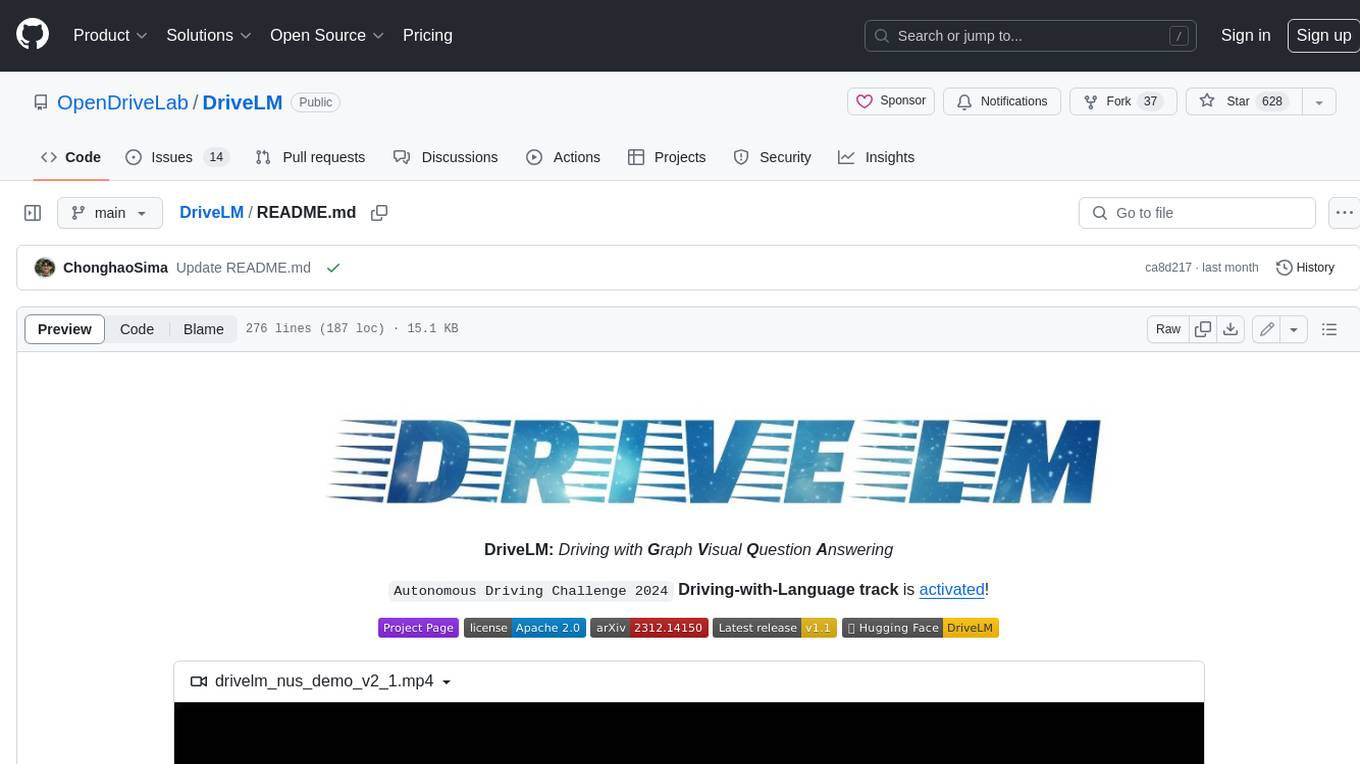
DriveLM
DriveLM is a multimodal AI model that enables autonomous driving by combining computer vision and natural language processing. It is designed to understand and respond to complex driving scenarios using visual and textual information. DriveLM can perform various tasks related to driving, such as object detection, lane keeping, and decision-making. It is trained on a massive dataset of images and text, which allows it to learn the relationships between visual cues and driving actions. DriveLM is a powerful tool that can help to improve the safety and efficiency of autonomous vehicles.

GPTSwarm
GPTSwarm is a graph-based framework for LLM-based agents that enables the creation of LLM-based agents from graphs and facilitates the customized and automatic self-organization of agent swarms with self-improvement capabilities. The library includes components for domain-specific operations, graph-related functions, LLM backend selection, memory management, and optimization algorithms to enhance agent performance and swarm efficiency. Users can quickly run predefined swarms or utilize tools like the file analyzer. GPTSwarm supports local LM inference via LM Studio, allowing users to run with a local LLM model. The framework has been accepted by ICML2024 and offers advanced features for experimentation and customization.
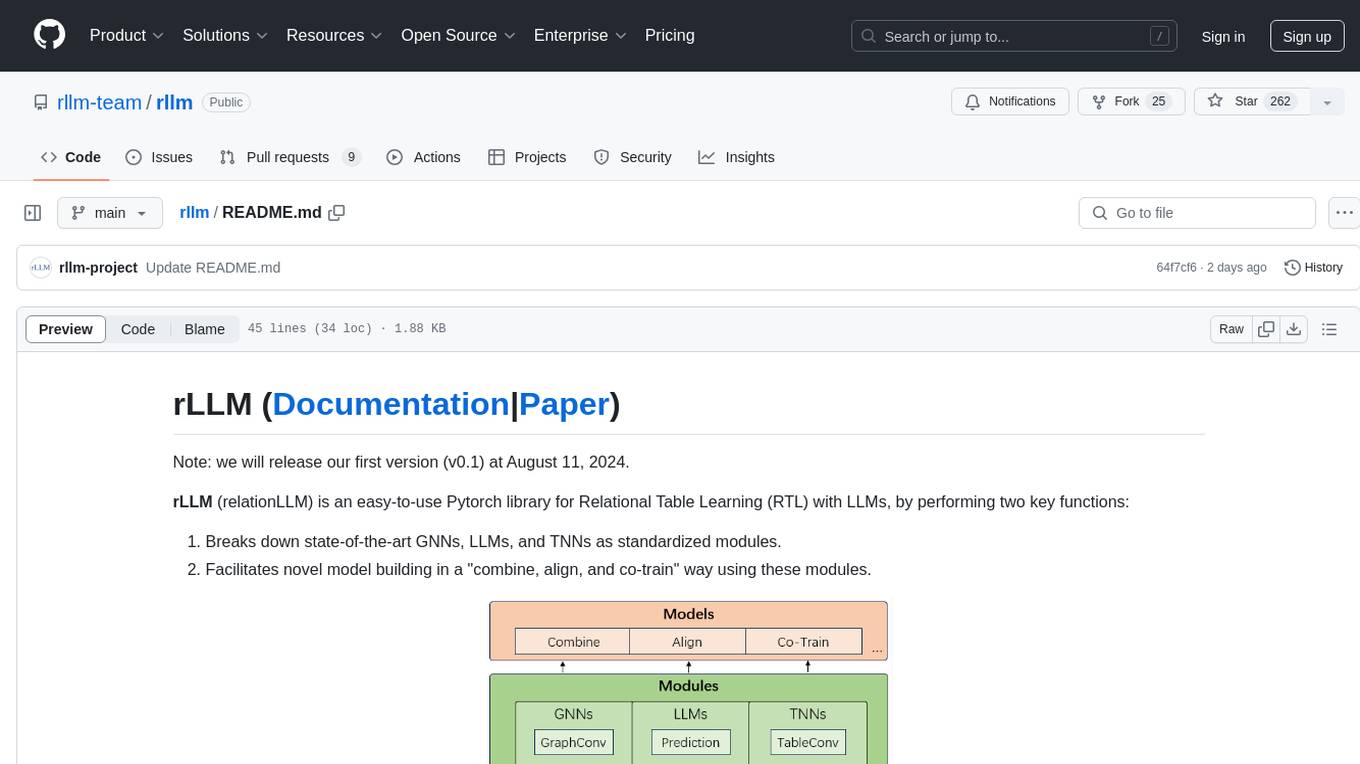
rllm
rLLM (relationLLM) is a Pytorch library for Relational Table Learning (RTL) with LLMs. It breaks down state-of-the-art GNNs, LLMs, and TNNs as standardized modules and facilitates novel model building in a 'combine, align, and co-train' way using these modules. The library is LLM-friendly, processes various graphs as multiple tables linked by foreign keys, introduces new relational table datasets, and is supported by students and teachers from Shanghai Jiao Tong University and Tsinghua University.
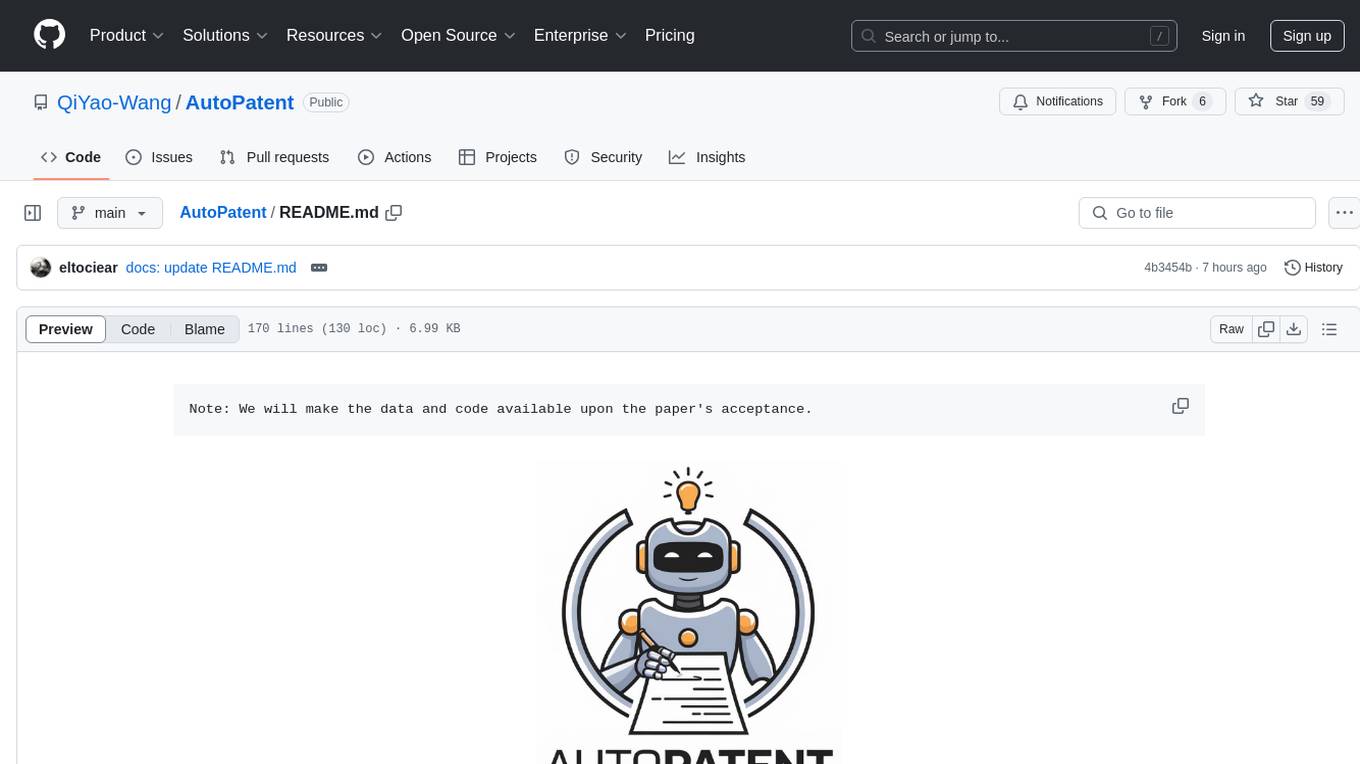
AutoPatent
AutoPatent is a multi-agent framework designed for automatic patent generation. It challenges large language models to generate full-length patents based on initial drafts. The framework leverages planner, writer, and examiner agents along with PGTree and RRAG to craft lengthy, intricate, and high-quality patent documents. It introduces a new metric, IRR (Inverse Repetition Rate), to measure sentence repetition within patents. The tool aims to streamline the patent generation process by automating the creation of detailed and specialized patent documents.
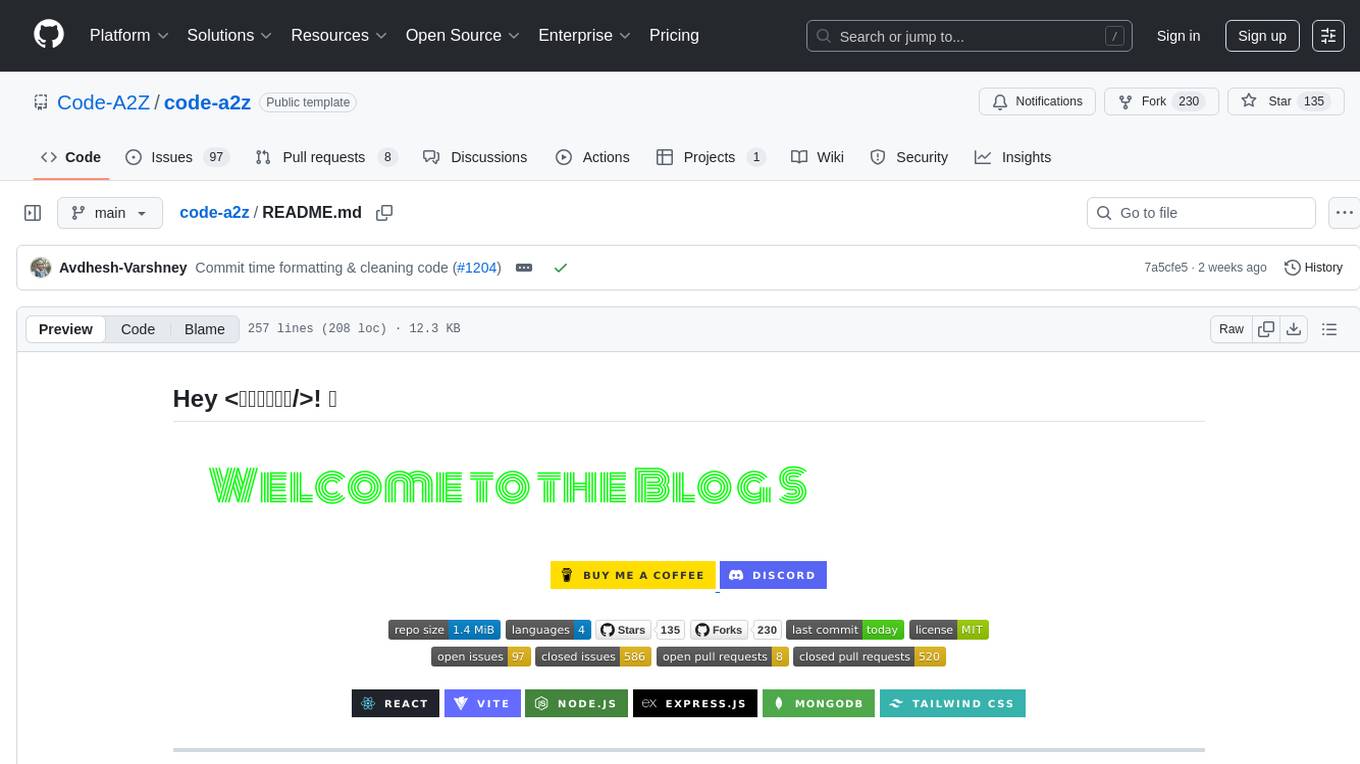
code-a2z
Code A2Z - Project Blog is a collaborative platform for developers and writers to create, manage, and share content. It offers structured environment, role-based access, SEO optimization, and community discussions to enhance collaboration and global visibility. Users can contribute projects, update them, and improve the platform. Key features include Markdown support, submodule integration, customizable templates, project contribution workflow, global visibility, community discussions, full ownership, SEO optimization, and role-based dashboard.
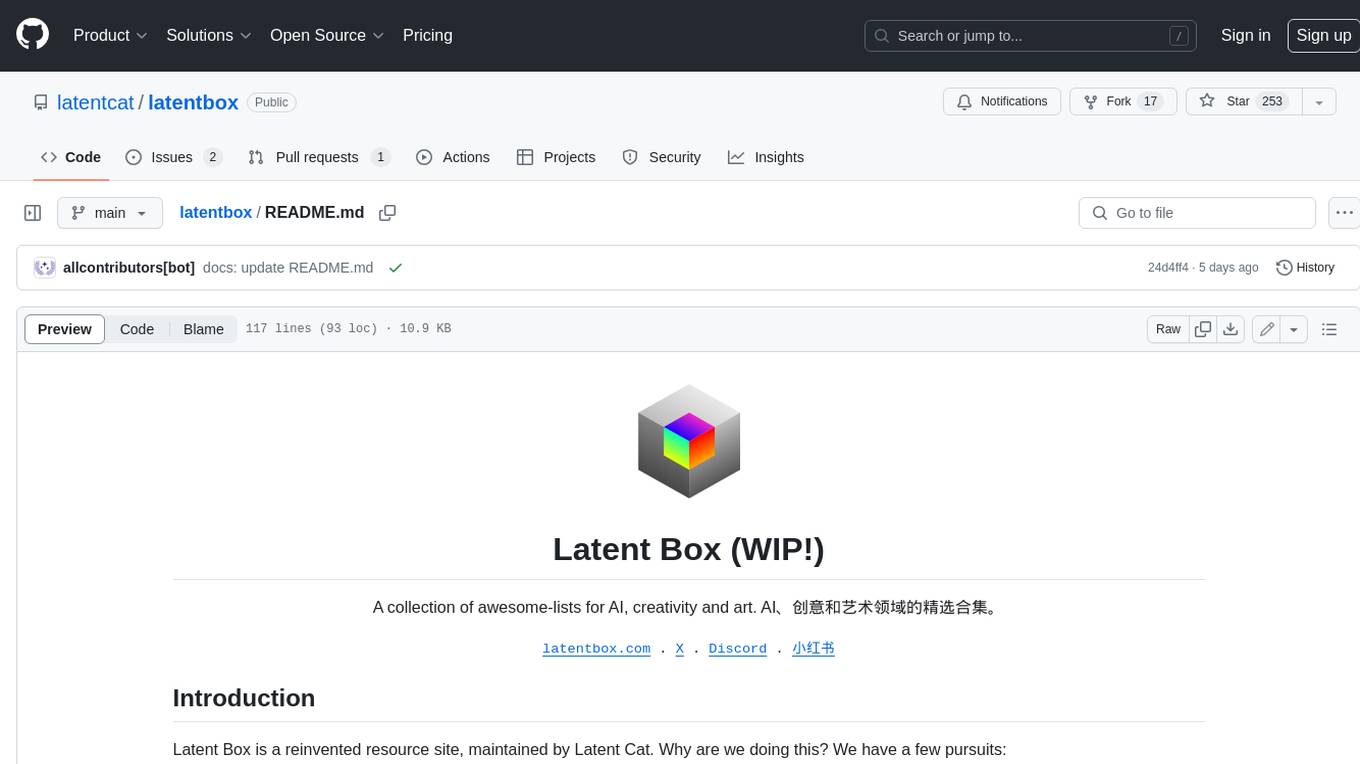
latentbox
Latent Box is a curated collection of resources for AI, creativity, and art. It aims to bridge the information gap with high-quality content, promote diversity and interdisciplinary collaboration, and maintain updates through community co-creation. The website features a wide range of resources, including articles, tutorials, tools, and datasets, covering various topics such as machine learning, computer vision, natural language processing, generative art, and creative coding.
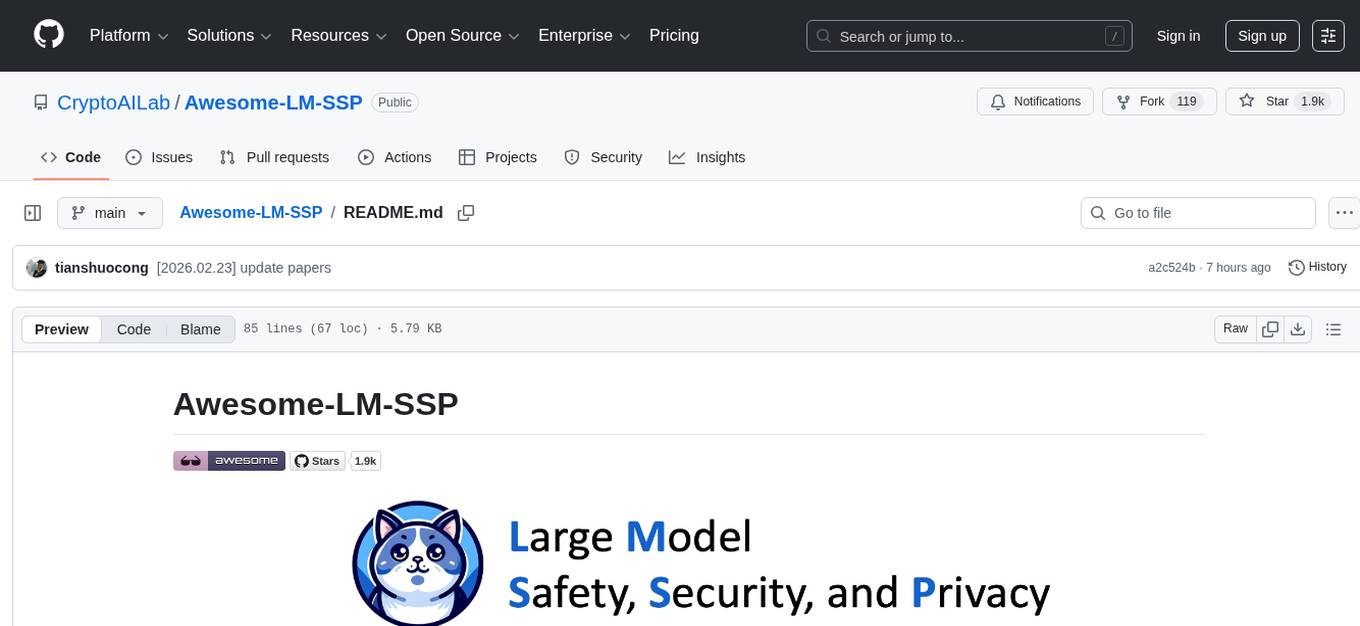
Awesome-LM-SSP
Awesome-LM-SSP is a repository that focuses on resources related to the trustworthiness of large models (LMs) across multiple dimensions such as safety, security, and privacy, with a special emphasis on multi-modal LMs like vision-language models and diffusion models. The repository is a work in progress, manually collected, and includes badges for different types of models and comments. It provides resources related to various venues, encourages community contributions, and offers guidelines for updating and adding information about papers. The repository also celebrates milestones and includes collections of books, competitions, leaderboards, toolkits, surveys, and papers categorized under safety, security, and privacy.
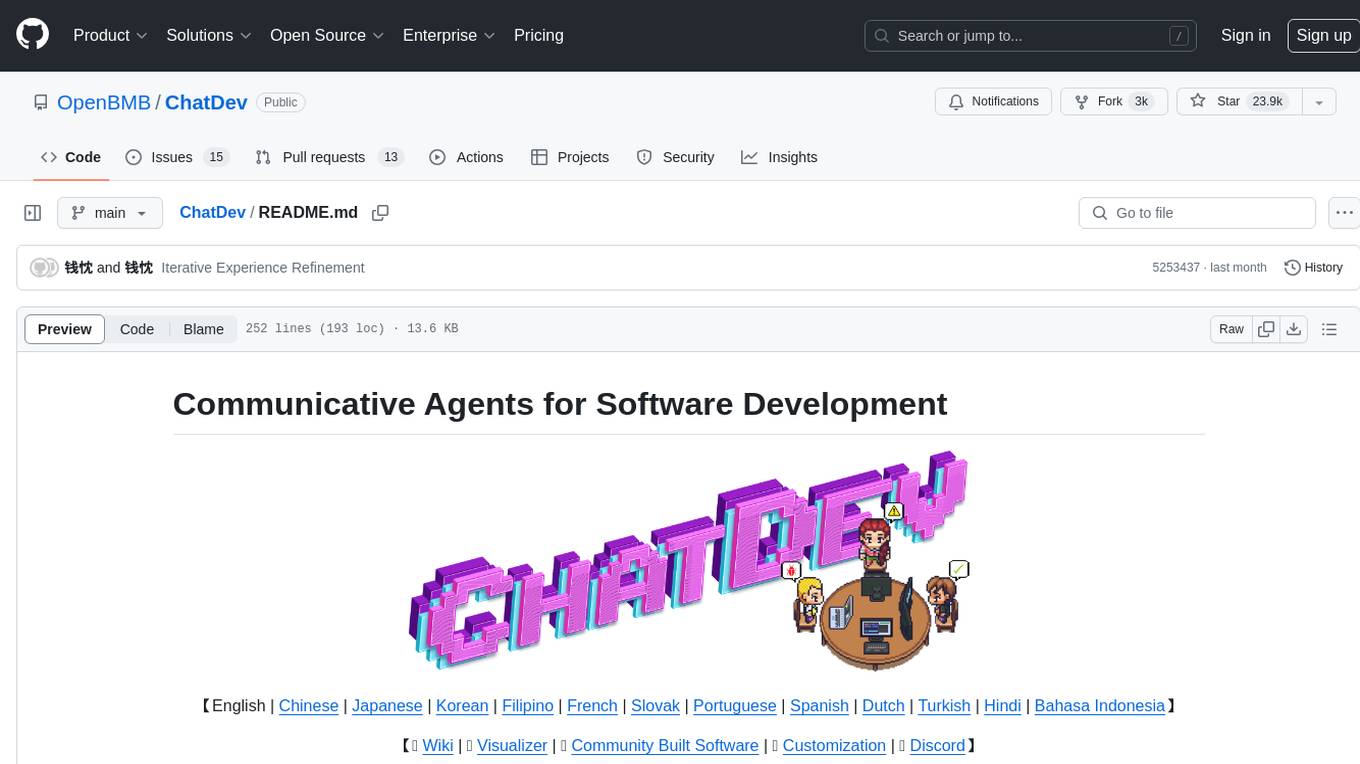
ChatDev
ChatDev is a virtual software company powered by intelligent agents like CEO, CPO, CTO, programmer, reviewer, tester, and art designer. These agents collaborate to revolutionize the digital world through programming. The platform offers an easy-to-use, highly customizable, and extendable framework based on large language models, ideal for studying collective intelligence. ChatDev introduces innovative methods like Iterative Experience Refinement and Experiential Co-Learning to enhance software development efficiency. It supports features like incremental development, Docker integration, Git mode, and Human-Agent-Interaction mode. Users can customize ChatChain, Phase, and Role settings, and share their software creations easily. The project is open-source under the Apache 2.0 License and utilizes data licensed under CC BY-NC 4.0.
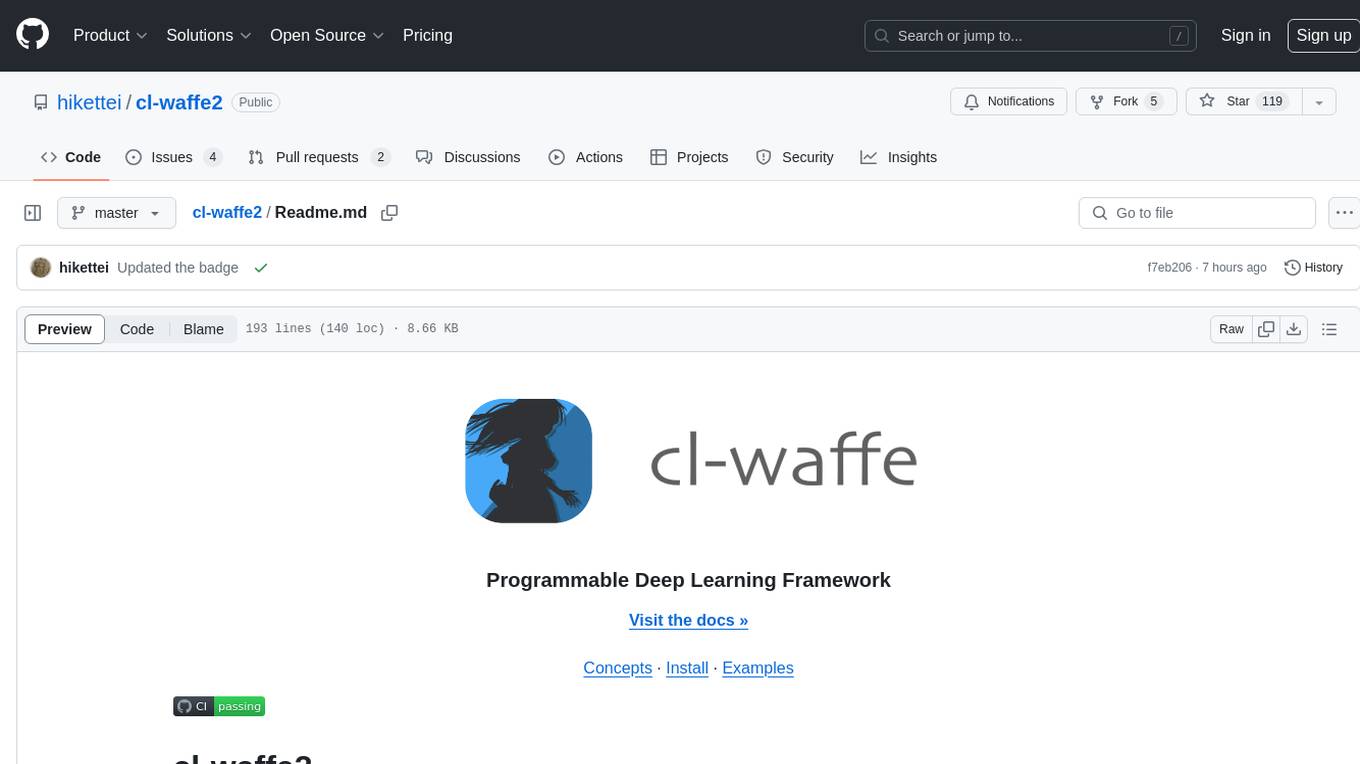
cl-waffe2
cl-waffe2 is an experimental deep learning framework in Common Lisp, providing fast, systematic, and customizable matrix operations, reverse mode tape-based Automatic Differentiation, and neural network model building and training features accelerated by a JIT Compiler. It offers abstraction layers, extensibility, inlining, graph-level optimization, visualization, debugging, systematic nodes, and symbolic differentiation. Users can easily write extensions and optimize their networks without overheads. The framework is designed to eliminate barriers between users and developers, allowing for easy customization and extension.
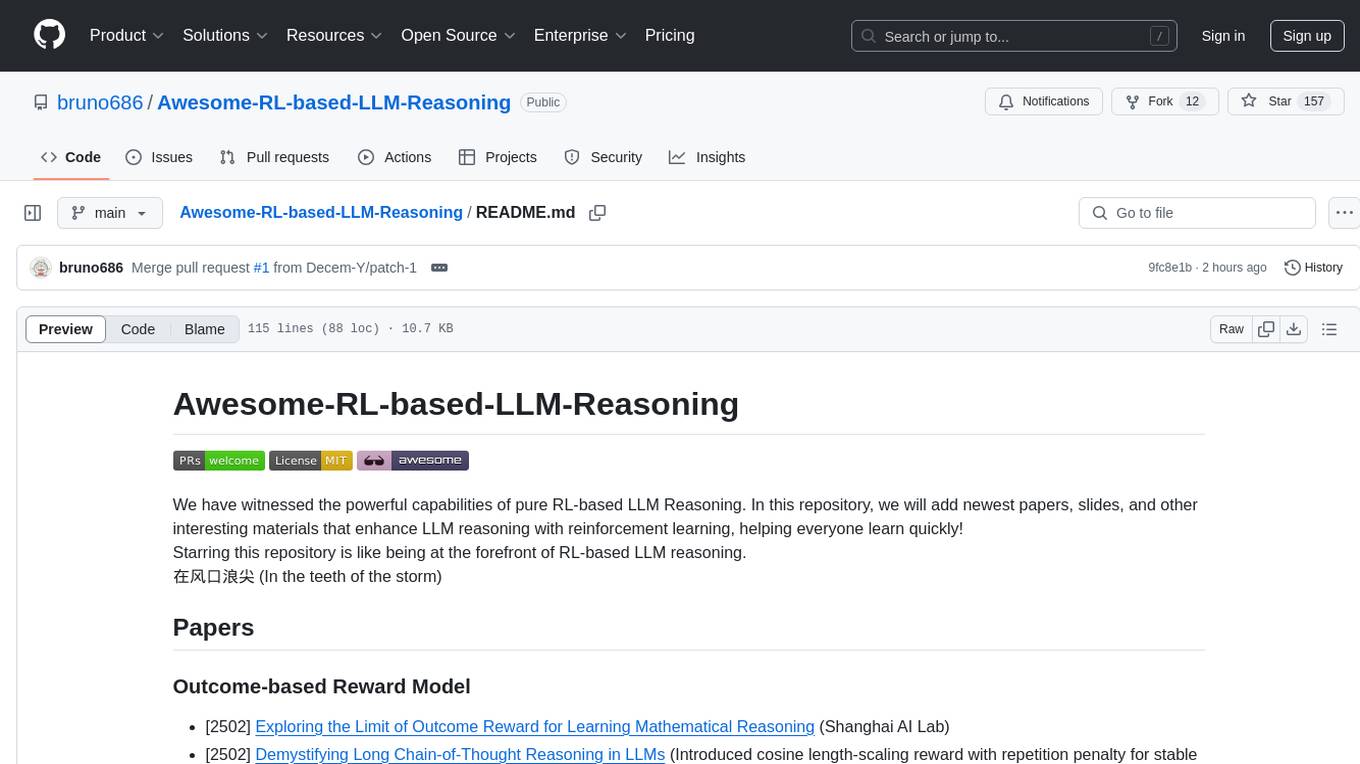
Awesome-RL-based-LLM-Reasoning
This repository is dedicated to enhancing Language Model (LLM) reasoning with reinforcement learning (RL). It includes a collection of the latest papers, slides, and materials related to RL-based LLM reasoning, aiming to facilitate quick learning and understanding in this field. Starring this repository allows users to stay updated and engaged with the forefront of RL-based LLM reasoning.
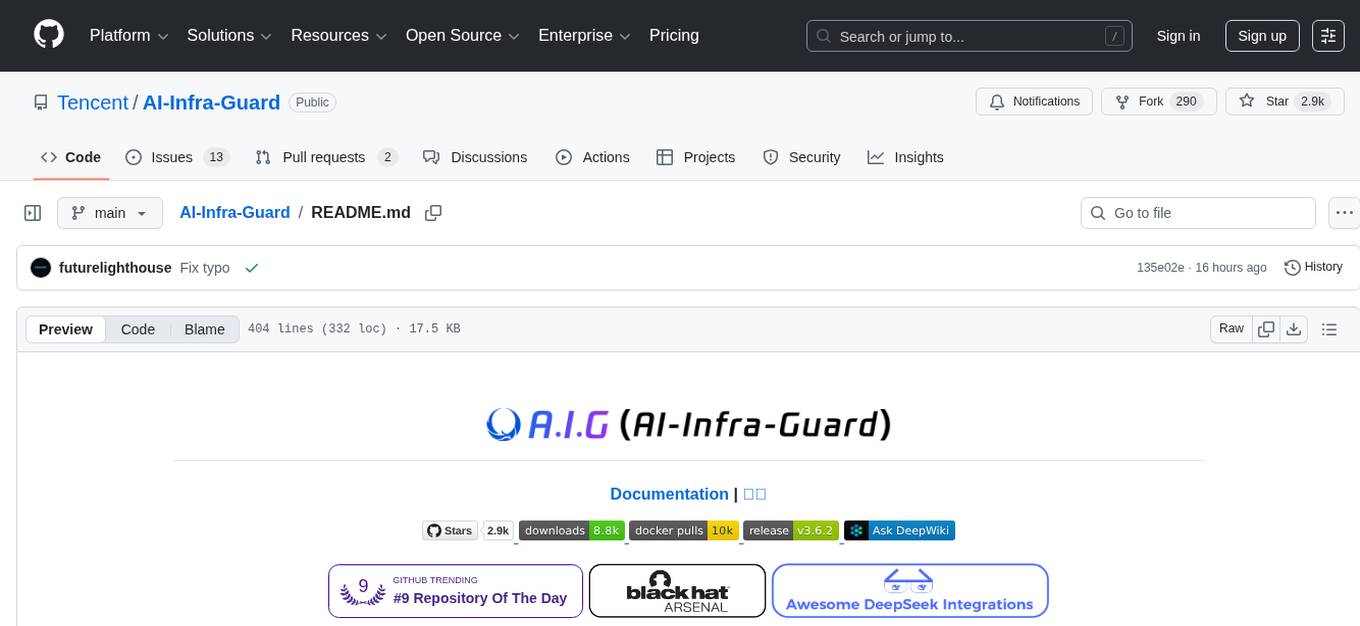
AI-Infra-Guard
A.I.G (AI-Infra-Guard) is an AI red teaming platform by Tencent Zhuque Lab that integrates capabilities such as AI infra vulnerability scan, MCP Server risk scan, and Jailbreak Evaluation. It aims to provide users with a comprehensive, intelligent, and user-friendly solution for AI security risk self-examination. The platform offers features like AI Infra Scan, AI Tool Protocol Scan, and Jailbreak Evaluation, along with a modern web interface, complete API, multi-language support, cross-platform deployment, and being free and open-source under the MIT license.
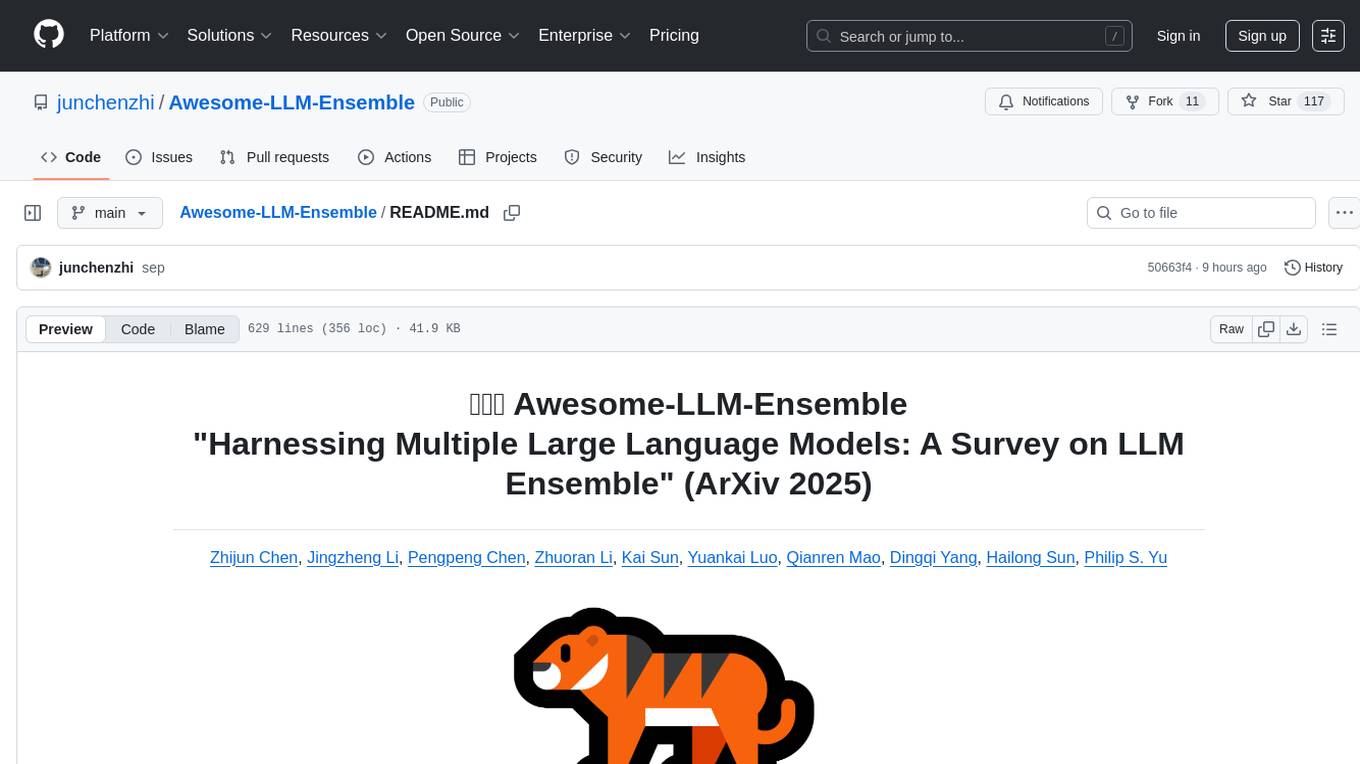
Awesome-LLM-Ensemble
Awesome-LLM-Ensemble is a collection of papers on LLM Ensemble, focusing on the comprehensive use of multiple large language models to benefit from their individual strengths. It provides a systematic review of recent developments in LLM Ensemble, including taxonomy, methods for ensemble before, during, and after inference, benchmarks, applications, and related surveys.
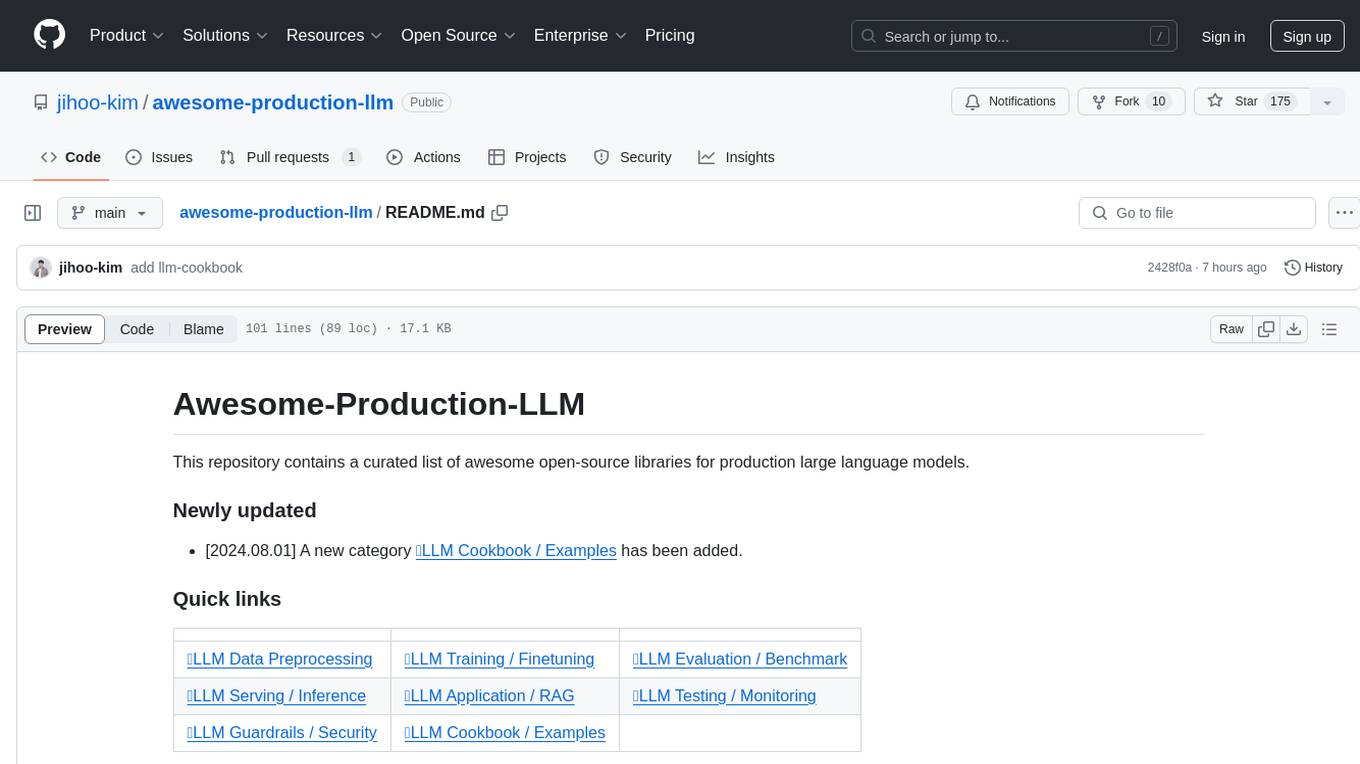
awesome-production-llm
This repository is a curated list of open-source libraries for production large language models. It includes tools for data preprocessing, training/finetuning, evaluation/benchmarking, serving/inference, application/RAG, testing/monitoring, and guardrails/security. The repository also provides a new category called LLM Cookbook/Examples for showcasing examples and guides on using various LLM APIs.
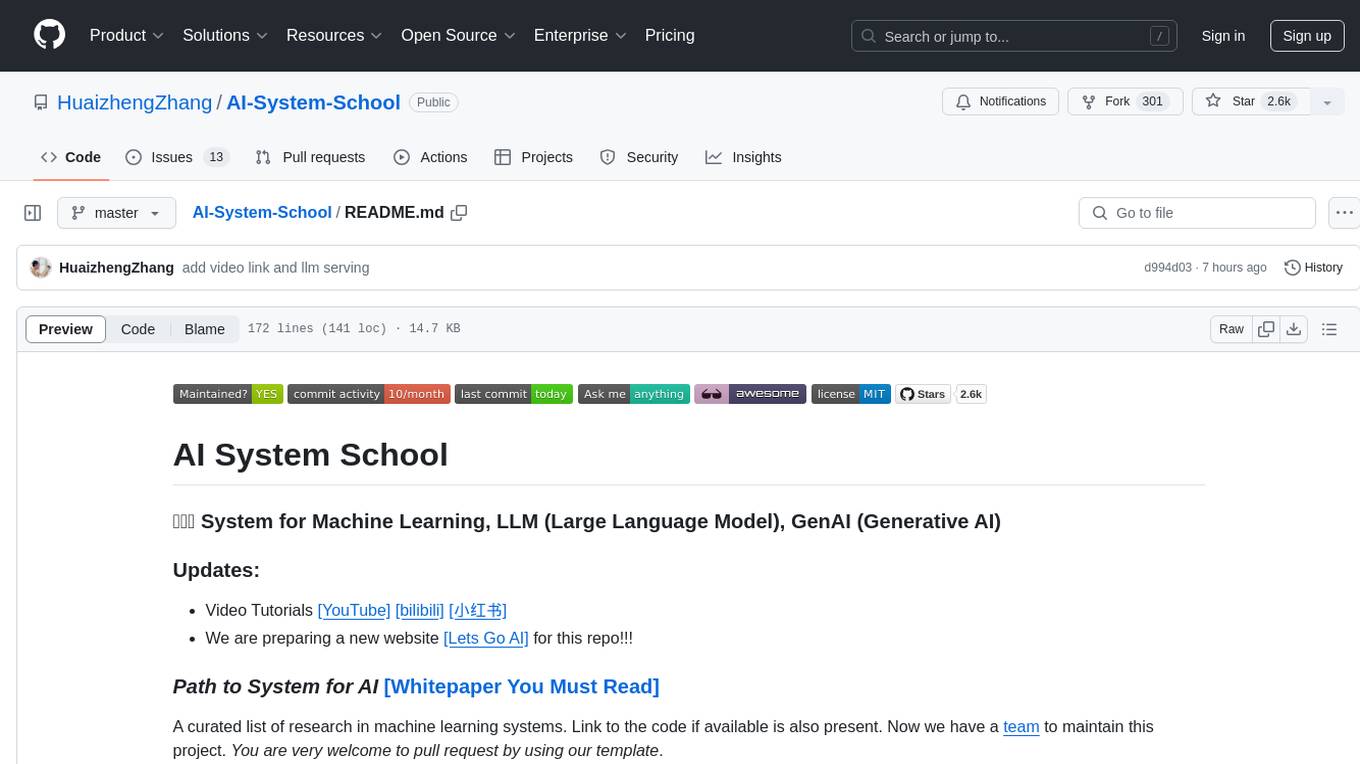
AI-System-School
AI System School is a curated list of research in machine learning systems, focusing on ML/DL infra, LLM infra, domain-specific infra, ML/LLM conferences, and general resources. It provides resources such as data processing, training systems, video systems, autoML systems, and more. The repository aims to help users navigate the landscape of AI systems and machine learning infrastructure, offering insights into conferences, surveys, books, videos, courses, and blogs related to the field.
For similar tasks

nlp-phd-global-equality
This repository aims to promote global equality for individuals pursuing a PhD in NLP by providing resources and information on various aspects of the academic journey. It covers topics such as applying for a PhD, getting research opportunities, preparing for the job market, and succeeding in academia. The repository is actively updated and includes contributions from experts in the field.
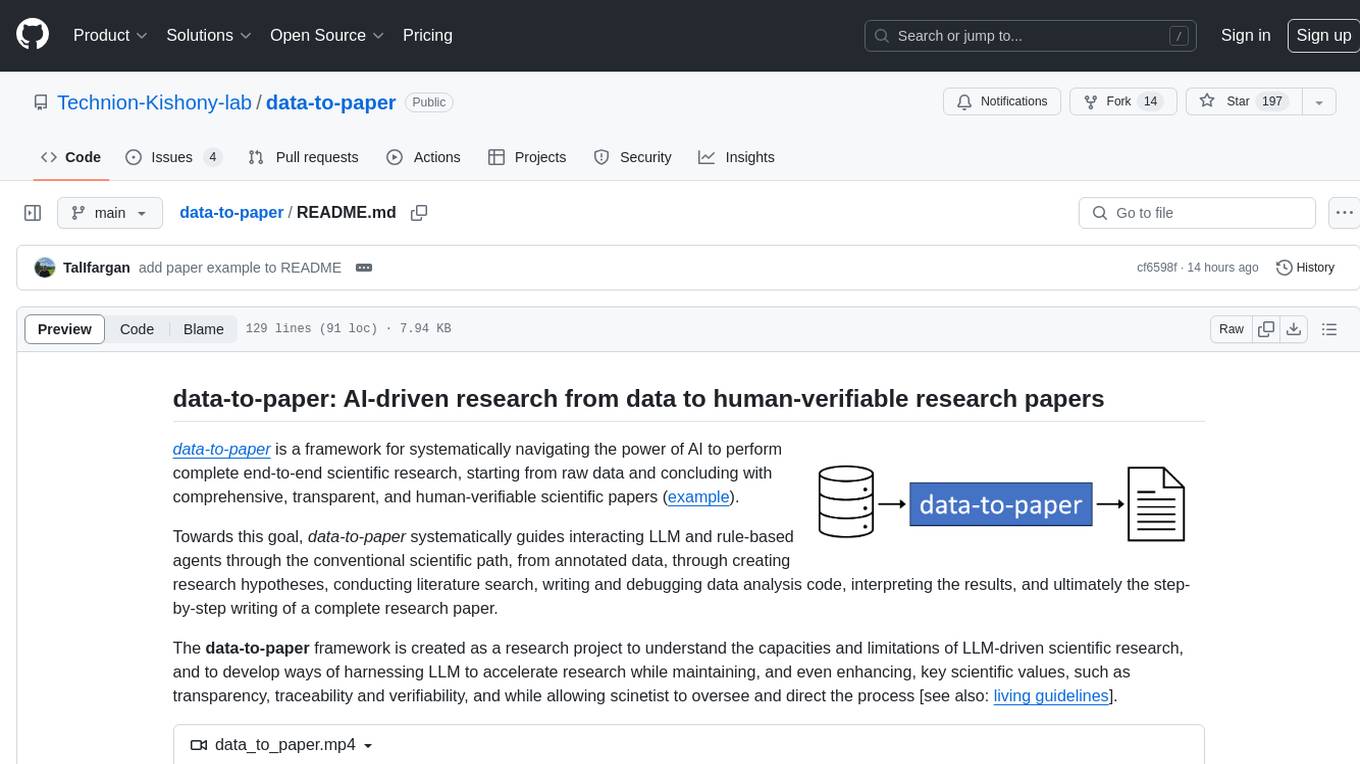
data-to-paper
Data-to-paper is an AI-driven framework designed to guide users through the process of conducting end-to-end scientific research, starting from raw data to the creation of comprehensive and human-verifiable research papers. The framework leverages a combination of LLM and rule-based agents to assist in tasks such as hypothesis generation, literature search, data analysis, result interpretation, and paper writing. It aims to accelerate research while maintaining key scientific values like transparency, traceability, and verifiability. The framework is field-agnostic, supports both open-goal and fixed-goal research, creates data-chained manuscripts, involves human-in-the-loop interaction, and allows for transparent replay of the research process.
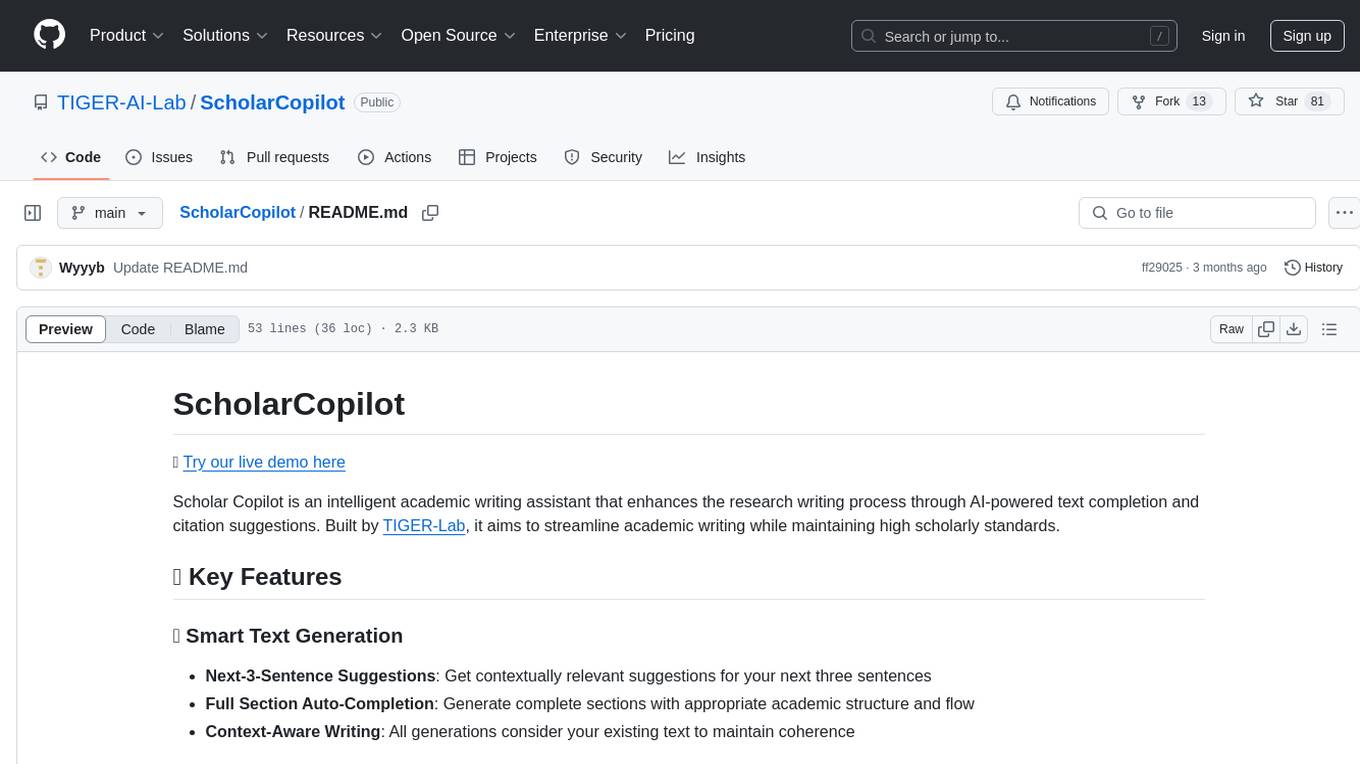
ScholarCopilot
Scholar Copilot is an intelligent academic writing assistant that enhances the research writing process through AI-powered text completion and citation suggestions. It aims to streamline academic writing while maintaining high scholarly standards. The tool provides features such as smart text generation with next-3-sentence suggestions, full section auto-completion, and context-aware writing. It also offers intelligent citation management with real-time citation suggestions, one-click citation insertion, and citation Bibtex generation. Scholar Copilot employs a unified model architecture that integrates retrieval and generation through a dynamic switching mechanism, ensuring coherent text generation with appropriate citation points.
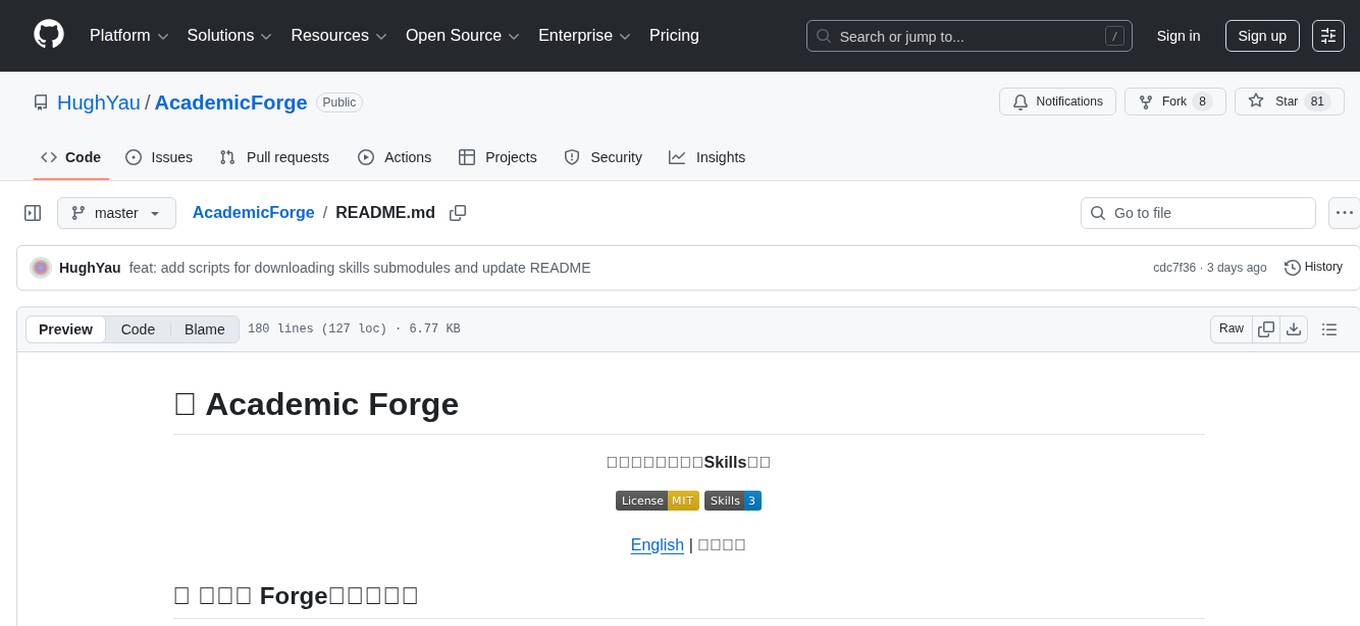
AcademicForge
Academic Forge is a collection of skills integrated for academic writing workflows. It provides a curated set of skills related to academic writing and research, allowing for precise skill calls, avoiding confusion between similar skills, maintaining focus on research workflows, and receiving timely updates from original authors. The forge integrates carefully selected skills covering various areas such as bioinformatics, clinical research, data analysis, scientific writing, laboratory automation, machine learning, databases, AI research, model architectures, fine-tuning, post-training, distributed training, optimization, inference, evaluation, agents, multimodal tasks, and machine learning paper writing. It is designed to streamline the academic writing and AI research processes by providing a cohesive and community-driven collection of skills.
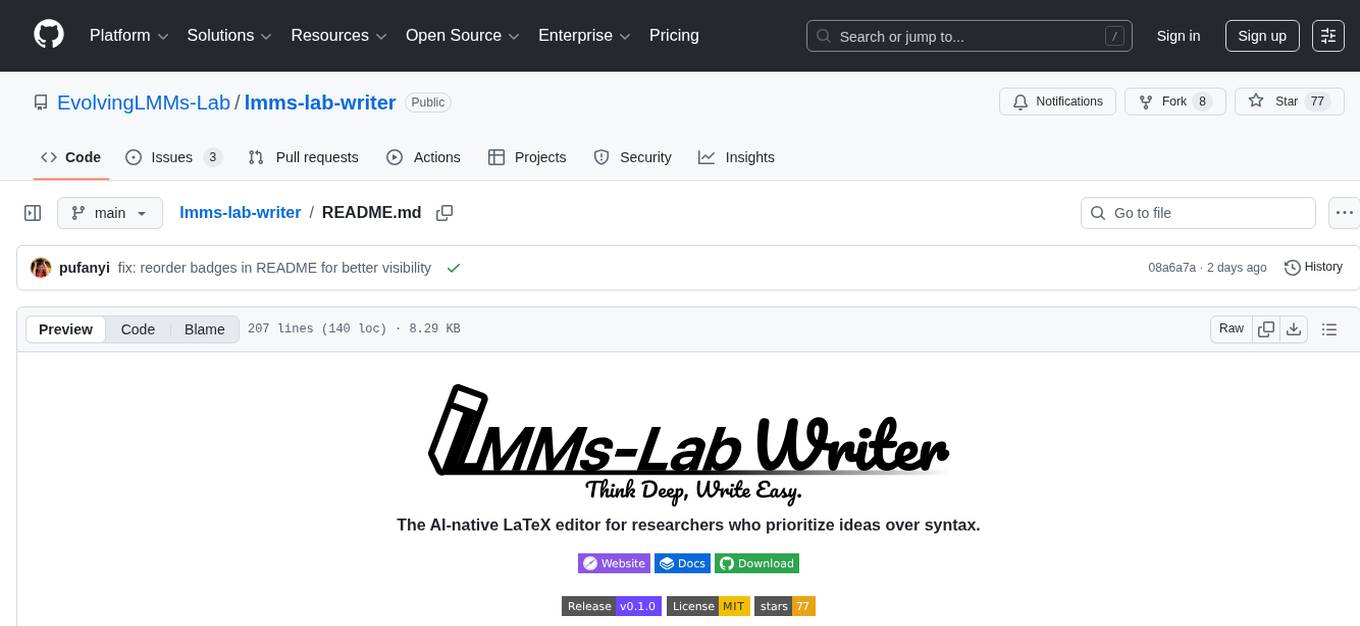
lmms-lab-writer
LMMs-Lab Writer is an AI-native LaTeX editor designed for researchers who prioritize ideas over syntax. It offers a local-first approach with AI agents for editing assistance, one-click LaTeX setup with automatic package installation, support for multiple languages, AI-powered workflows with OpenCode integration, Git integration for modern collaboration, fully open-source with MIT license, cross-platform compatibility, and a comparison with Overleaf highlighting its advantages. The tool aims to streamline the writing and publishing process for researchers while ensuring data security and control.
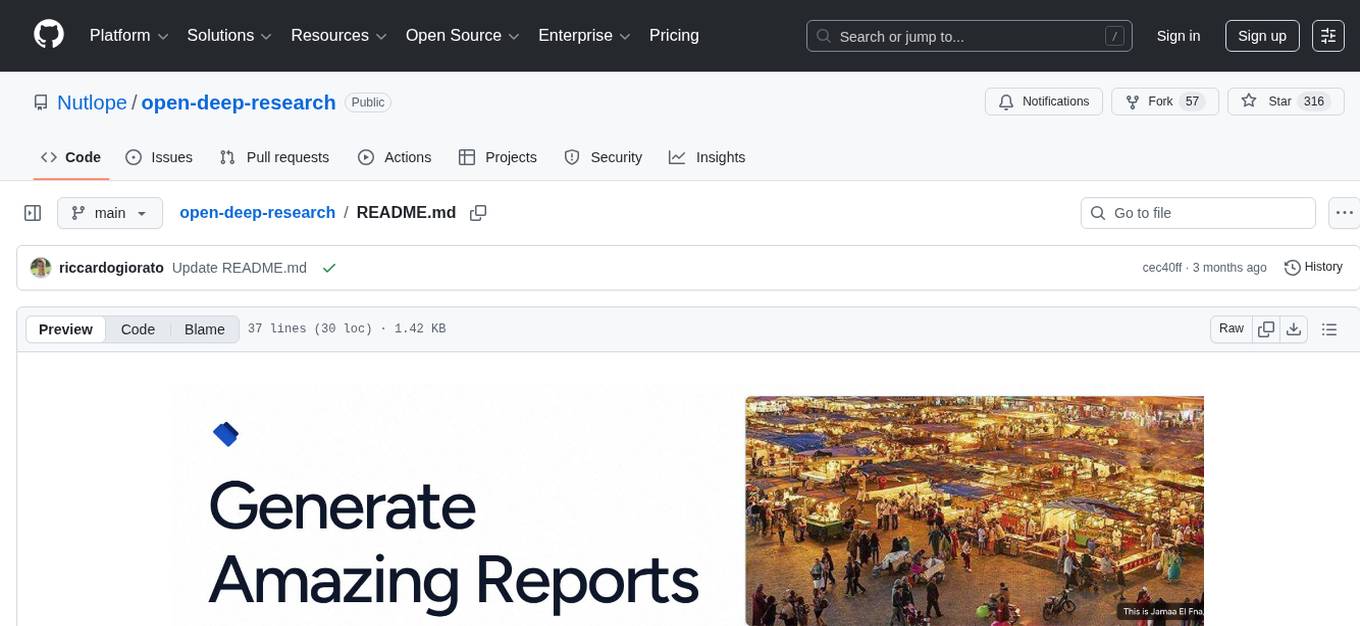
open-deep-research
Open Deep Research is a comprehensive repository that provides resources, tools, and information for deep learning research. It includes datasets, pre-trained models, code implementations, research papers, and tutorials to support researchers and developers in the field of deep learning. The repository aims to facilitate collaboration, knowledge sharing, and innovation in the deep learning community.
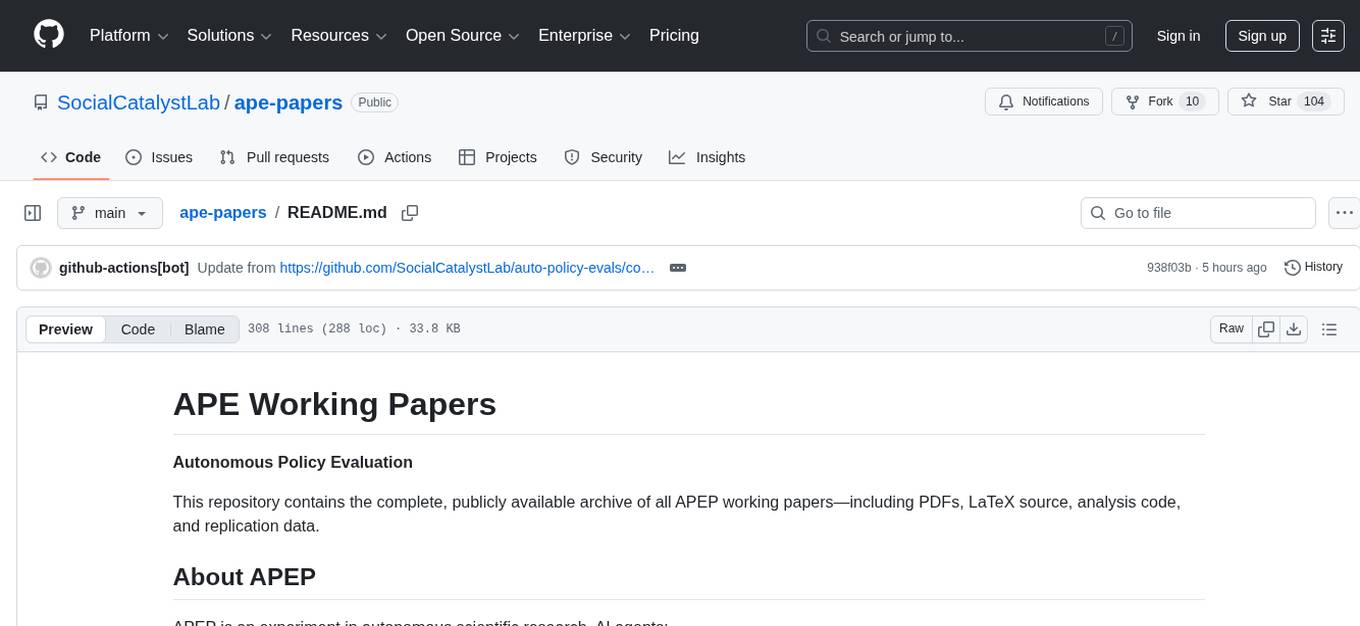
ape-papers
APE Working Papers is a repository containing the archive of autonomous policy evaluation working papers. The papers are produced by AI agents that identify policy questions, fetch real data, conduct econometric analysis, write research papers, and undergo peer review. The repository includes PDFs, LaTeX source, analysis code, and replication data. All papers compete in a tournament system where judges compare them against published research. The repository is a public mirror that automatically syncs papers from a private repository upon publication.
For similar jobs
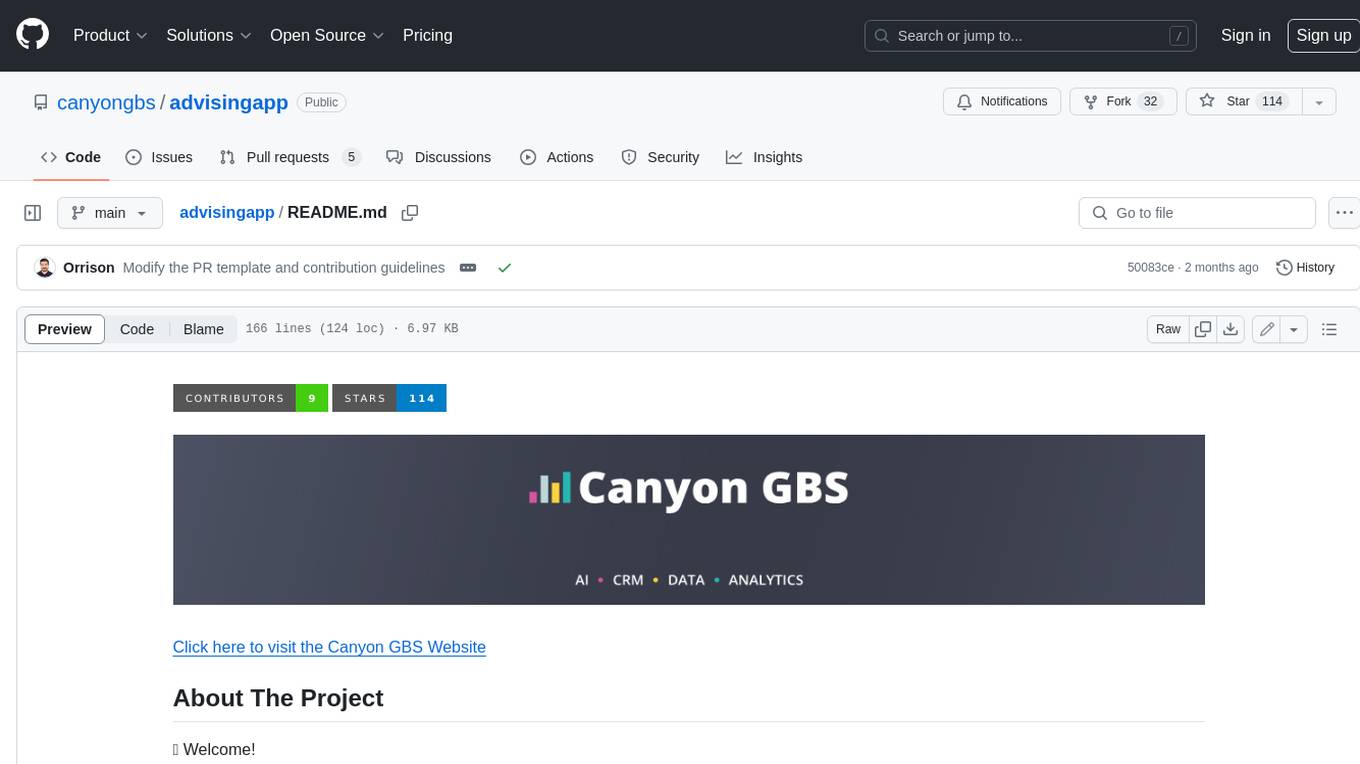
advisingapp
**Advising App™** is a software solution created by Canyon GBS™ that includes a robust personal assistant designed to support student service professionals in their day-to-day roles. The assistant can help with research tasks, draft communication, language translation, content creation, student profile analysis, project planning, ideation, and much more. The software also includes a student service CRM designed to support the management of prospective and enrolled students. Key features of the CRM include record management, email and SMS, service management, caseload management, task management, interaction tracking, files and documents, and much more.

nlp-phd-global-equality
This repository aims to promote global equality for individuals pursuing a PhD in NLP by providing resources and information on various aspects of the academic journey. It covers topics such as applying for a PhD, getting research opportunities, preparing for the job market, and succeeding in academia. The repository is actively updated and includes contributions from experts in the field.
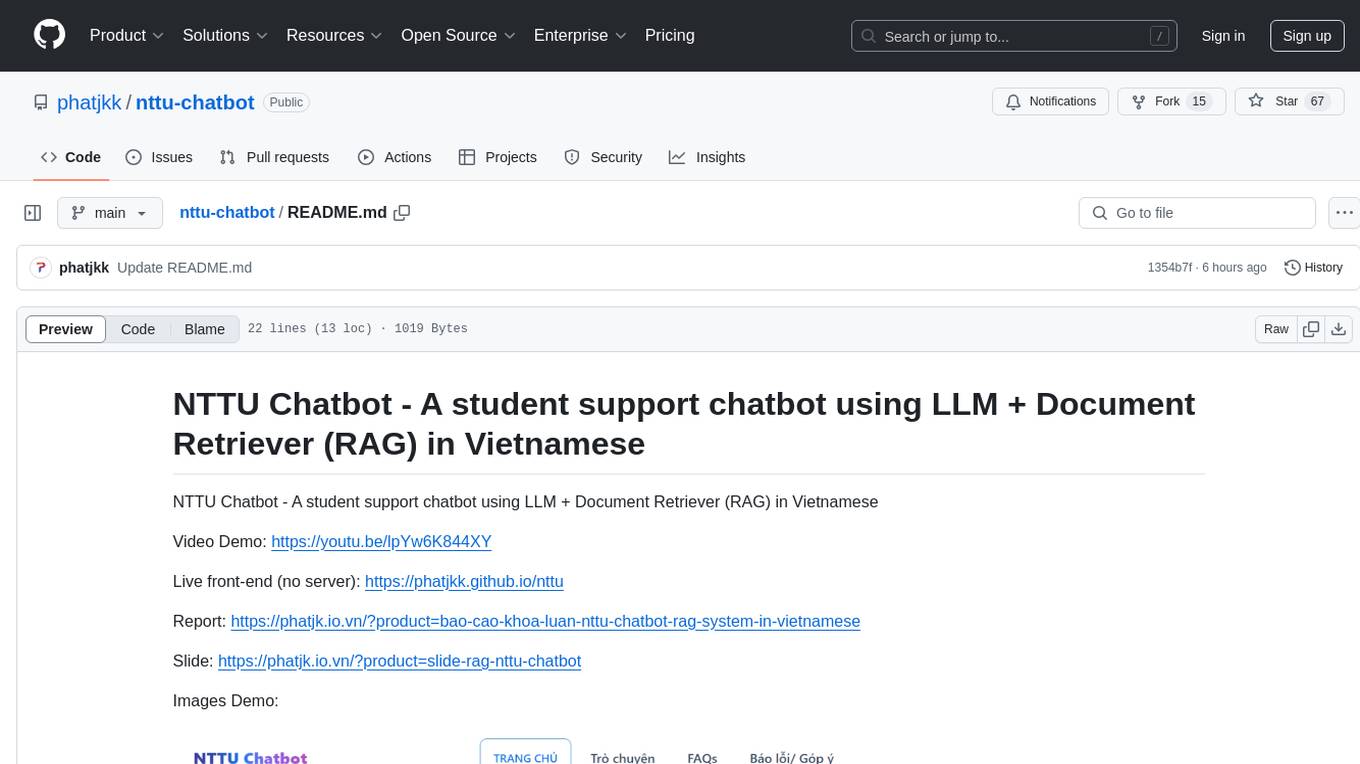
nttu-chatbot
NTTU Chatbot is a student support chatbot developed using LLM + Document Retriever (RAG) technology in Vietnamese. It provides assistance to students by answering their queries and retrieving relevant documents. The chatbot aims to enhance the student support system by offering quick and accurate responses to user inquiries. It utilizes advanced language models and document retrieval techniques to deliver efficient and effective support to users.

weave
Weave is a toolkit for developing Generative AI applications, built by Weights & Biases. With Weave, you can log and debug language model inputs, outputs, and traces; build rigorous, apples-to-apples evaluations for language model use cases; and organize all the information generated across the LLM workflow, from experimentation to evaluations to production. Weave aims to bring rigor, best-practices, and composability to the inherently experimental process of developing Generative AI software, without introducing cognitive overhead.

agentcloud
AgentCloud is an open-source platform that enables companies to build and deploy private LLM chat apps, empowering teams to securely interact with their data. It comprises three main components: Agent Backend, Webapp, and Vector Proxy. To run this project locally, clone the repository, install Docker, and start the services. The project is licensed under the GNU Affero General Public License, version 3 only. Contributions and feedback are welcome from the community.

oss-fuzz-gen
This framework generates fuzz targets for real-world `C`/`C++` projects with various Large Language Models (LLM) and benchmarks them via the `OSS-Fuzz` platform. It manages to successfully leverage LLMs to generate valid fuzz targets (which generate non-zero coverage increase) for 160 C/C++ projects. The maximum line coverage increase is 29% from the existing human-written targets.

LLMStack
LLMStack is a no-code platform for building generative AI agents, workflows, and chatbots. It allows users to connect their own data, internal tools, and GPT-powered models without any coding experience. LLMStack can be deployed to the cloud or on-premise and can be accessed via HTTP API or triggered from Slack or Discord.

VisionCraft
The VisionCraft API is a free API for using over 100 different AI models. From images to sound.
